#this will be very interesting to meta on later i can say that much
Text
....I feel Some Kinda Way about the capital-Q Queerness of this season thus far, I'll tell you that.
#good omens s2#i mean it obviously always was a metaphor for queerness and religion#and the damage that religion especially fundamentalist organized religion does to queer people#but that + the maggie/nina subplot#has got me In My Thoughts#this will be very interesting to meta on later i can say that much#(just started ep 3)
252 notes
·
View notes
Text
A Nightingale Sang in 1941
This is my inaugural meta (yay!) Eventually I will learn how to add gifs and whatnot to make this more interesting but today, I give you a wall of text.
I need to give credit where credit is due to three existing metas that I’m drawing upon heavily here:
A speculative continuation of the 1941 story, which includes an almost-kiss while “A Nightingale Sang in Berkeley Square” plays on the gramophone,
A behavioral analysis of Aziraphale during the S2E6 finale (will find ref later if possible)
A meta-analysis of the way in which “coffee” is used as a symbolic equivalent for liberty and freedom of choice, a running theme of this show (will find ref later if possible)
I’m going to expand upon meta #2 and #3 and explain why I think there is are very compelling reasons to believe that #1 will be canonized.
At the end of S1E6, an instrumental version of “A Nightingale Sang in Berkeley Square” plays diegetically, but the lyrical version plays non-diegetically over the credits (we hear it but the protagonists don’t). So we the audience could plausibly say “that’s their song,” but as of the close of S1, we have no reason to believe that they know that it’s their song. Even Aziraphale’s S1E3 (1967) suggestion that they dine at the Ritz could be a reference that only he gets, or just a fancy restaurant suggestion.
So when I was watching S2E6 and Crowley said “no nightingales,” I was jarred. What does that even mean? We know it has something to do with dining at the Ritz, but what does it mean to them? The reference only works if they know it’s their song. But we’ve only ever seen them hear it together after the averted apocalypse; if this is the direct reference that Crowley is making, it leaves our 1967 reference contextless and twisting in the wind.
If we assume that there was a romantic story beat in 1941, wherein “A Nightingale Sang in Berkeley Square” (which, incidentally, was written in 1939 and saw the height of its popularity at the end of 1940, so timeline-wise it’s spot-on) became their song, then a lot of events get renewed interpretations through this lens, in a way that makes this story much more cohesive and the “no nightingales” comment even more soul-shattering than it already was.
Let’s presume that immediately after this became their song and just as they were discovering their romantic potential, they were forced back into hiding. Forever after, references to the song serve as a macro for “I’d like to pick up where we left off that night.”
The 1967 suggestion of “dining at the Ritz” now becomes a directly romantic suggestion. It also gives better context for “you go too fast for me.”
Actually going to the Ritz in 2019 is not simply a celebration or even a callback to 1967, it’s a callback to their almost-romance of 1941.
When Crowley says “no nightingales” in 2023, this isn’t to say “we’re not going to eat together at the Ritz anymore.” It’s saying that the romance that began that night, the precious, fragile romance, is over.
I’ll give you a moment to dry your eyes before we move on to metas #2 and #3.
In light that this is what has been going on - they know they want a romantic relationship but have gotten so used to hiding and denying it that they are more comfortable keeping the status quo static and quo-y then trying to achieve their ideal - a lot of S2 behavior can get a fresh view.
Crowley’s reaction to Nina isn’t a realization that he’s in love - he knew that already. You can only ask someone to run away with you so many times before you are forced to admit some things to yourself. No, he’s realizing that trying to hide it (which was justified by survival), hasn’t been working, but despite failing at being stealth nothing bad has happened. He’s realizing that it may finally be safe to show it.
Crowley’s confession, then, is not a revelation. It’s making the subtext text. He’s not telling Aziraphale anything he didn’t already know. He’s saying it now because he thinks he’s safe to do so. Pin in that.
Lots of people have lots of theories about Aziraphale’s motivations in the S2 finale, which can more or less be divided into 4 camps: the genuinely held belief, the coffee theory, the lie theory, and the mutual trick theory (some version of the body-switching at the end of S1). Let me start by saying that I love all the fans and all their theories and I find their analyses to be insightful. The genuinely held belief theory, while I believe it to be erroneous, has been incredibly conducive to so many wonderful conversations and I love being in a community that has those conversations. But I’m going to explain why I think the lie theory finds the most support in canon.
Re-watch the finale (when you feel like you can) from 35:18 to 36:19 and then from 40:45 to the end, paying very close attention to Aziraphale’s words and his eyes. Michael Sheen is telling us a LOT with his eyes, and in the back half of the finale scene, with pacing.
For 60 seconds of footage, this setup is doing a lot of work. If Neil Gaiman wasn’t doing enough to beat us over the head with how evil the Metatron is, that glare at Crowley at the end with the non-diegetic ominous horns should convey the message. But again, focusing on Aziraphale. He initially refuses to talk to the Metatron; he’s made his position quite clear. There is no hint of regret or wavering; this is not someone who’s aching to return to the fold. The Metatron ignores his refusal and functionally forces him to accept a “cup of coffee.” The coffee isn’t spiked, but it is a metaphor. It is symbolic of choice. The Metatron is going to force Aziraphale to make a choice. Meta #3 does a great job of exploring the idea that a choice between anything and death is never really a choice. Hang onto that thought.
Notice I had you start up again 3 seconds before “The Conversation.” That’s because it’s important to note where the Metatron is right now. He is across the street, staring straight in through those giant windows to where our protagonists are about to have The Conversation. He is watching.
When Aziraphale returns, Crowley begins his “let me talk” riff. Aziraphale ought to be interested in what Crowley has to say, since the preamble is pretty compelling. You’ll notice that Aziraphale quickly turns to the window and back, through which he (but not we) can see the Metatron standing there, watching them. Aziraphale is then doing his best to get Crowley to STFU without raising the suspicion of the Metatron, eventually having to cut him off.
Because unfortunately, Crowley’s entire impetus for speaking up now is that it’s safe to do so. Only Aziraphale knows that they are in very real danger (or at least, Crowley is, but I’ll come back to that).
You might take something from the fact that he’s shaking his head while talking about “incredibly good news,” and seems to self-censor his criticism of Metatron (or more specifically, he takes ownership of any criticism of the Metatron, censoring out Crowley’s role in that, with the emphasis on I in “I might have misjudged him”).
Notice in the flashback that he begins the conversation reasonably relaxed. The Metatron also says a series of things about him that not only are false, but everyone, including the Metatron and Crowley, know are false: Aziraphale is not a leader, he’s a defector; he’s not honest, he lies all the time, in fact this entire season revolved around his one huge lie of hiding Gabriel. Not only does the justification not make sense coming from Metatron, but it shouldn’t make sense that Aziraphale would accept these reasons and it shouldn’t make sense to Crowley either. So is Aziraphale including these details in his recounting to Crowley so that he will get suspicious and figure out the jig? Maybe. Let’s continue.
Immediately upon being offered the job of Supreme Archangel, Aziraphale says “but I don’t want to go back to Heaven.” This is direct evidence against the genuinely held belief theory. If returning to Heaven and making a difference was a genuine motivation, we would have gotten a different response at this moment. But then we get something more.
“Where would I get my coffee?”
This is a beautiful response for a number of reasons; coffee should be trivial compared to the opportunity to be a Supreme Archangel, so it serves to highlight just how little interest Aziraphale has in returning. Taken at face value, it’s the Aziraphale equivalent of “not even at gunpoint.” But remember that coffee is a metaphor for liberty in this universe and this season. So what Aziraphale just said, in the language of Neil Gaiman metaphors, is:
I don’t want to go back to Heaven, I would rather have free will.
What does the Metatron do next?
He brings up Crowley.
Watch Aziraphale’s eyes before and after the mention of Crowley. He goes from confused to eye-flicking panic in the space of two syllables. Aziraphale already understands that his “no” is not being accepted, and that bringing Crowley into it can only possibly serve as a threat.
So the coffee, the choice, is a false choice. No one ever orders death. The Metatron has forced Aziraphale into a situation that looks an awful lot like a choice (it comes in a blue cup, after all) but it isn’t.
We definitely have some reliable narrator problems here. I’m going to presume for purposes of analysis that these cut-outs are accurate but incomplete, and that a more explicit threat about what would happen to Crowley if Aziraphale did not return to Heaven was made.
If we assume that Aziraphale has been made aware of a threat and is trying to hide that from Crowley, the rest of this scene reads very differently. Aziraphale cannot say, “you are in danger but you will be safe if you swear your allegiance to Heaven” or “I have to go, no matter what, and the only way we can be together is if you come with me,” but nonetheless he now has to convince Crowley to do the one thing he ought to know Crowley definitely doesn’t want to do all through subtext. Which we’ve spent an entire season establishing that they can’t communicate well when they are allowed to use their words. Disastrously, this is not a magic trick that Aziraphale can make work when it counts. Their failure to practice good communication means that, right now, when it counts most, they are not going to pull it off.
We see that Aziraphale is very hopeful that Crowley will pick up on his cues and play along. Obviously, he doesn’t.
If the whole riff about Hell being bad guys and Heaven being the side of truth and light is taken as genuine, it discards a massive amount of character development that we’ve witnessed in Job, Edinburgh, etc. (again, to all the genuine belief subscribers, I think it’s a compelling argument but it simply doesn’t account for the evidence). So if it’s not genuine, why say it? Again, to alert Crowley that something is Off, because Crowley should know that Aziraphale doesn’t actually believe that. They saved humanity from Heaven and Hell. They hid Gabriel from Heaven and Hell. Crowley knows that Aziraphale knows that Heaven and Hell are just two sides of the same coin. Notice again that Aziraphale glances out the window while he’s talking up Heaven; he knows the Metatron is watching, he can’t not defend the position of Heaven. I think it’s also worth noting that Aziraphale forcefully glances and gestures off to Crowley’s left (away from the window) when talking about Hell, and then turns his head to Crowley’s right (towards the window) to try to get him to realize that a representative of Heaven is literally standing right over there, just look out the window please dumbass!
When Crowley is asking Aziraphale if he said no, and we see the back of Aziraphale’s head, again we can see him turn his head to glance out the window. This is also when he changes strategies, and admits that Heaven could use a little reform. Because now there’s a problem almost as big as getting caught, which is that he won’t be able to get Crowley to go with him.
Which unfortunately makes the next part of this so much more heartbreaking. Because when Crowley begins his speech about being a team, Aziraphale wants to hear it. He can’t bring himself to shut down Crowley again, even though it could get them both in massive trouble. Notice that he glances out the window again during this, and the look of panic on his face. He begins to shake his head when Crowley mentions that Heaven and Hell are toxic; this can be taken a lot of ways but I’ll argue for the interpretation that he’s trying to get Crowley to STFU and stop saying shit that could get him destroyed.
After Crowley puts on his sunglasses we are in the “back half” and Sheen is doing a lot with phrasing here, specifically pregnant pauses.
“Come with me… to Heaven!”
“We can be together… as angels!”
Based on the pacing decision I am thoroughly convinced that the first half of each of these statements is intended to be the message to Crowley and the second half is always a qualifying statement to satisfy the Metatron.
Unfortunately, these pregnant pauses are completely backfiring in their effect on Crowley. The sentiment gives him hope and the qualifying statement crushes it again immediately. He is being taken on a horrible emotional rollercoaster with these declarations which are only further amping up his instinct to run away.
The only truly genuine, unaldulterated statement I think we get from Aziraphale is
“I need you!”
When it becomes clear to Aziraphale that there’s been an irreparable breakdown of communication between them and the subtext is not getting across, he says:
“I don’t think you understand what I’m offering you.”
He means this literally. Crowley has not understood that Aziraphale is offering him protection from whatever threat the Metatron has made.
Which makes this part extra-devastating and also absolutely in keeping with a major running theme of this season.
“I understand. I think I understand a whole lot better than you do.”
Your understanding and my understanding are different understandings.
Crowley views the offer to return to Heaven through the lens of his trauma. He understands what life in Heaven would be like. But he doesn’t understand that Aziraphale is offering him protection.
But Aziraphale just heard Crowley say that he understood everything, and he’s still going to leave. There might be a little suspense of disbelief here to believe that Aziraphale really interpreted the statement this way, but we know that Aziraphale isn’t always the brightest battery-operated candle in the drawer. So under the assumption that Crowley did understand him and is still rejecting the offer, rejecting him—
“Well, then there’s nothing more to say.”
Please pay very close attention to Aziraphale’s body language for the next part. He’s active, agitated, turning side to side, arms swinging. This is a very fidgety angel.
“No nightingales.”
Aziraphale is now completely still. He’s feeling that feeling. You know it. The one where your entire body is getting sucked into the pit of your stomach. The aching paralysis.
This is their song, the one that began their romance in 1941, the secret code for all other attempts at flirtation. Crowley has walked out on him before, Aziraphale has been stubborn and obstinate before. But they always came back together, sometimes with an apology dance or other rituals that belonged solely to them.
But now the song is over.
By saying this, Crowley has broken up with Aziraphale. We can see in Aziraphale’s sudden transition from fidgety to paralysis that he has understood it this way.
Then he turns away from the window so that the Metatron won’t see him cry.
The kiss was heart-wrenching already. But we’re not done with this analysis.
During the kiss, Aziraphale has a choice to make between two very compelling bad choices. This is the Job dilemma. But worse.
If he doesn’t kiss Crowley back, he will let Crowley think that he doesn’t love him. He will have missed out on this (maybe/probably their first kiss?) and regret it forever.
If he does kiss Crowley back, in full view of the Metatron, they are in deep trouble.
He seems to do his best to split the difference. I would even go so far to say that the awkward arm waving is Aziraphale acting for the Metatron’s benefit, to try to portray that he doesn’t want this even though he absolutely does (just not like this). The anguish when they break the kiss is absolutely real, and the first thing he does is glance out the window. Through all this he has remained painfully aware of their spectator.
He wants to say I love you. He mouths it. He breathes it.
But the Metatron is watching.
He can’t tell Crowley I love you. So he has to say the only other thing that has always unequivocally meant “I love you” when he said it to Crowley. He has to hope that Crowley understands him now, even though he never has before.
Spoiler alert: Crowley doesn’t.
My forgiveness and your forgiveness are not the same forgiveness.
One more point against the genuine belief fans (I love you): if the offer to let Crowley back in is what changed his mind, then Crowley declining removes that incentive. Aziraphale should/would have consequently retreated to his last stated position of “I don’t want to go back to Heaven, where would I get my Crowley—I mean, coffee?” [post-publication nod to @theonevoice for a great little meta] It simply doesn’t hold up to scrutiny.
I think a lot of fans were already making these assumptions about the use of the nightingale song so this meta may not feel revelatory, however, it isn’t canon (yet), and I’m sure I’ll find company that agree that canonization of this connection would strengthen a lot of these story points, as evidenced by how it is already assumed by many fans.
If you made it to the end - omg thank you! Please leave a note and tell me your thoughts!
Bonus: somebody already made the song connection here
~~~
if you liked this, you may also like:
Book of Life and what it means for Crowley
The Erasure of Human!Metatron
Baraqiel and Azazel
~~~
Recommended related (lie theory) metas by other people:
making the subtext text by @theonevoice
Aziraphale's Decision Matrix by @yowlthinks
Nothing Lasts Forever: META by @phoen1xr0se
#good omens#good omens 2#neil gaiman#coffee theory#lie theory#no nightingales#metatron#good omens meta#the metatron#good omens 2x06#fuck metatron#metatron good omens#good omens 1941#michael sheen#crowley#aziracrow#aziraphale x crowley#ineffable husbands#aziraphale#ivoc
1K notes
·
View notes
Text
Every now and then I think about how subtitles (or dubs), and thus translation choices, shape our perception of the media we consume. It's so interesting. I'd wager anyone who speaks two (or more) languages knows the feeling of "yeah, that's what it literally translates to, but that's not what it means" or has answered a question like "how do you say _____ in (language)?" with "you don't, it's just … not a thing, we don't say that."
I've had my fair share of "[SHIP] are [married/soulmates/fated/FANCY TERM], it's text!" "[CHARACTER A] calls [CHARACTER B] [ENDEARMENT/NICKNAME], it's text!" and every time. Every time I'm just like. Do they though. Is it though. And a lot of the time, this means seeking out alternative translations, or translation meta from fluent or native speakers, or sometimes from language learners of the language the piece of media is originally in.
Why does it matter? Maybe it doesn't. To lots of people, it doesn't. People have different interests and priorities in fiction and the way they interact with it. It's great. It matters to me because back in the early 2000s, I had dial-up internet. Video or audio media that wasn't available through my local library very much wasn't available, but fanfiction was. So I started to read English language Gundam Wing fanfic before I ever had a chance to watch the show.
When I did get around to watching Gundam Wing, it was the original Japanese dub. Some of the characters were almost unrecognisable to me, and first I doubted my Japanese language ability, then, after checking some bits with friends, I wondered why even my favourite writers, writers I knew to be consistent in other things, had made these characters seem so different … until I had the chance to watch the US-English dub a few years later. Going by that adaptation, the characterisation from all those stories suddenly made a lot more sense. And the thing is, that interpretation is also valid! They just took it a direction that was a larger leap for me to make.
Loose adaptations and very free translations have become less frequent since, or maybe my taste just hasn't led me their way, but the issue at the core is still a thing: Supernatural fandom got different nuances of endings for their show depending on the language they watched it in. CQL and MDZS fandom and the never-ending discussions about 知己 vs soulmate vs Other Options. A subset of VLD fans looking at a specific clip in all the different languages to see what was being said/implied in which dub, and how different translators interpreted the same English original line. The list is pretty much endless.
And that's … idk if it's fine, but it's what happens! A lot of the time, concepts -- expressed in language -- don't translate 1:1. The larger the cultural gap, the larger the gaps between the way concepts are expressed or understood also tend to be. Other times, there is a literal translation that works but isn't very idiomatic because there's a register mismatch or worse.
And that's even before cultural assumptions come in.
It's normal to have those. It's also important to remember that things like "thanks I hate it" as a sentiment of praise/affection, while the words translate literally quite easily, emphatically isn't easy to translate in the sense anglophone internet users the phrase.
Every translation is, at some level, a transformative work. Sometimes expressions or concepts or even single words simply don't have an exact equivalent in the target language and need to be interpreted at the translator's discretion, especially when going from a high-context/listener-responsible source language to a low-context/speaker-responsible target language (where high-context/listener responsible roughly means a large amount of contextual information can be omitted by the speaker because it's the listener's responsibility to infer it and ask for clarification if needed, and low-context/speaker-responsible roughly means a lot of information needs to be codified in speech, i.e. the speaker is responsible for providing sufficiently explicit context and will be blamed if it's lacking).
Is this a mouse or a rat? Guess based on context clues! High-context languages can and frequently do omit entire parts of speech that lower-context/speaker-responsible languages like English regard as essential, such as the grammatical subject of a sentence: the equivalent of "Go?" - "Go." does largely the same amount of heavy lifting as "is he/she/it/are you/they/we going?" - "yes, I am/he/she/it is/we/you/they are" in several listener-responsible languages, but tends to seem clumsy or incomplete in more speaker-responsible ones. This does NOT mean the listener-responsible language is clumsy. It's arguably more efficient! And reversely, saying "Are you going?" - "I am (going)" might seem unnecessarily convoluted and clumsy in a listener-responsible language. All depending on context.
This gets tricky both when the ambiguity of the missing subject of the sentence is clearly important (is speaker A asking "are you going" or "is she going"? wait until next chapter and find out!) AND when it's important that the translator assign an explicit subject in order for the sentence to make sense in the target language. For our example, depending on context, something like "are we all going?" - "yes" or "they going, too?" might work. Context!
As a consequence of this, sometimes, translation adds things – we gain things in translation, so to speak. Sometimes, it's because the target language needs the extra information (like the subject in the examples above), sometimes it's because the target language actually differentiates between mouse and rat even though the source language doesn't. However, because in most cases translators don't have access to the original authors, or even the original authors' agencies to ask for clarification (and in most cases wouldn't get paid for the time to put in this extra work even if they did), this kind of addition is almost always an interpretation. Sometimes made with a lot of certainty, sometimes it's more of a "fuck it, I've got to put something and hope it doesn't get proven wrong next episode/chapter/ten seasons down" (especially fun when you're working on a series that's in progress).
For the vast majority of cases, several translations are valid. Some may be more far-fetched than others, and there'll always be subjectivity to whether something was translated effectively, what "effectively" even means …
ANYWAY. I think my point is … how interesting, how cool is it that engaging with media in multiple languages will always yield multiple, often equally valid but just sliiiiightly different versions of that piece of media? And that I'd love more conversations about how, the second we (as folks who don't speak the material's original language) start picking the subtitle or dub wording apart for meta, we're basically working from a secondary source, and if we're doing due diligence, to which extent do we need to check there's nothing substantial being (literally) lost -- or added! -- in translation?
#translation#linguistics (sorta)#I love language so much#long post#subtitling#dubbing#transformative work#if you read all the way to the end - THANK YOU I am so impressed#localisation#this is not an academic essay but I still feel bad for not citing sources#low vs high context cultures and languages are concepts from intercultural communication studies#but idk how up to date that is or whether folks even still actually use them#I know they oversimplify things#but it helped me say what I was trying to here so shrug#languages#language soup#meta#language meta#fandom meta of sorts#thanks for the help sorting this out kayla <3#my nonsense
1K notes
·
View notes
Text
thinking about that meta about the endless not really transforming into different forms but rather being all forms simultaneously and just being perceived differently from different points of view. and yeah
--
"So, Death was telling me something interesting about you yesterday," Hob says, sipping on his coffee.
Dream pouts, though he would probably deny that that's what it is. "You are gossiping with my sister behind my back?"
"You know we talk."
"Gossip," Dream mutters again, steps taking on a pace adjacent to an irritable trudge. "What unseemly things does she say about me?"
"Why do you think she says mean things about you?"
"Every time we speak, she calls me an idiot," Dream says, and Hob lets out a startled laugh.
"That's what siblings do," Hob reminds him. "You know she loves you."
"Hmm." Dream plucks Hob's coffee from his hand, taking a ponderous sip. "What praises does she heap upon me, then?"
Hob shakes his head in fond exasperation. "She says that you -- Endless, that is -- can like... change your appearance for different people? Or creatures? Like. If you met a cat you would appear as a cat to them?"
"You do not quite have the right of it," Dream says. He hasn't returned Hob's coffee, despite having insisted that he 'did not require mortal sustenance' when Hob had offered to get him his own.
"What's the right of it, then?"
"It is not for human minds to comprehend."
Hob groans. "At least humor me and try to explain? Do you turn into a cat or not?"
"I do not turn into anything," Dream says, offended. "How base and common."
"Shapeshifting is base and common, I'll make sure to tell all the shapeshifters I know," Hob tells him seriously.
Dream lets out a sigh that Hob recognizes as meaning fine, I will answer your inane questioning about the nature of my existence. The funny thing is, now that they've gotten over the six hundred year barrier of what's your name and what do you do for work, Dream delights in talking about his creations. He will speak at length about his work given half a chance.
It's the personal -- whether that's something as mundane as how he takes his tea or as fundamental as what an Endless even is, exactly -- that's been hard to get at.
"I am a cat," Dream explains.
Hob stares at him, looking up and down at the very man-shaped figure walking beside him as if he needs to double-check. "You're definitely not a cat."
"Yes, I am," Dream says. He does not appear to be joking.
And apparently Hob is still thirteen years old all these centuries later, because he says, "Prove it."
"You cannot see it because you are not a cat," Dream sighs, as if this is truly a tragic occurrence.
"Maybe I am a cat," Hob suggests, tucking his hands in his pockets, all casual. "How would you know?"
Dream gives him a sidelong look. "You are not a cat. Though perhaps you would be more peaceful as one."
"Doubt it. But wait, so, if I was a cat I would be able to see your cat form?"
"In essence, yes. But. You speak as if I would be donning a coat. These are not forms. Merely fragments. Simultaneous angles on a whole."
"Fragments," Hob repeats. He works it through like a particularly hard math problem. "Hang on. So. You're also a cat now. If we met a cat they would see a cat."
Fuck, this is getting weird.
Dream looks proud of Hob for getting it. "Yes."
"Could have attempted to explain that instead of just saying I am a cat," Hob tells him. "I also still maintain that you are not actually a cat."
"I am as much a cat as I am a human," Dream says.
"So, not," Hob says.
"No," Dream agrees. "Because I am Dream."
"You're a nightmare, is what you are," Hob mutters, and Dream smirks.
"That, too."
They've been walking in silence for another few minutes when Hob asks, "What's your real form?"
Dream frowns. "All of my forms are real, Hob."
"Sure, you look like this or that to different people. What do you look like to yourself?"
"All of my forms are real," Dream insists.
"So what I'm seeing now isn't some kind of default? Are you just always different? Is this like that we don't know how other people see colors 'cuz everyone's eyes could be different thing? Or is there any internal consistency to you?"
"I don't know what thing you're referring to."
"What I'm trying to find out is did I invent this version of you in my head?" Hob asks, getting stressed about it now. Did his subconscious somehow decide this was what Dream should look like? Presumably Dream knows what he looks like to Hob. What if he doesn't like it? "Did I just decide yep that's what dreams should look like in 1389 and you've been stuck wearing black ever since?"
Dream chuckles. Probably amused Hob would ever think he had that much power. "No. There is what you call internal consistency in my appearance. Different creatures, cultures, and so on will see different aspects of me, but there is not a different aspect for each person. It is not infinite."
Oh, thank god. "So, you want to look this way."
"I suppose."
Never a straight answer with him.
"Well, just for the record," Hob says, "I fell in love with the entity but I happen to quite like the shape as well."
"The shape," Dream repeats, with a smile.
"Here's where you're going to tell me you're also a triangle or something."
Dream is silent.
Fucking hell.
"I'm not even going to ask," Hob decides, forcibly moving on. "I have another question."
"You have many," Dream observes.
"That's what you love about me," Hob says, and Dream tilts his head as if conceding the point.
"If there was a human culture that thought of dreams as represented by cats," Hob starts, "they might see you as a cat?"
Dream sips at Hob's coffee, considering. "I suppose."
"And was there ever one?"
"No."
Hob lets out a long breath. Dream is frustrating as hell to talk to sometimes, but Hob can't say he doesn't enjoy it anyway, doesn't enjoy the puzzle. "Was there ever any culture like that, though? That saw their dream representation as something other than a person?"
"There was one that thought dreams lived in bubbles, therefore I was the reflection of light along a bubble's curve," Dream says, expressionlessly. As if that isn't wild and fascinating. "However, that civilization has since disbanded and morphed into different forms."
"Which civilization was that?"
"You would not know it," Dream says.
Hob tips his head back and groans. "God, you're like an edgy teenager who knew that indie band before they were cool. Oh, which band? No, you wouldn't know them, they're too niche, too underground."
"Underwater," says Dream. "It was a civilization of dolphins."
Hob trips over a crack in the road and just manages to catch himself. Dream stops by his side, watching him with some concern, like he worries Hob might break himself in his clumsiness.
"The way the world looks to you must be insane," Hob says, staring at Dream.
Dream's lips tip up in the faintest smile. "Human perspective is narrow."
"Clearly. I wish I could see all your other forms. Must be amazing."
"You wish to see them?" Dream sounds surprised.
Hob scoffs. "Of course. But it's not sounding very possible."
Dream inclines his head in agreement.
Then a thought occurs. "Wait." And god, Hob has said a lot of stupid-sounding things in his life but this is about to be one of the worst. "If I pretend to be a cat, can I see your cat form?"
Dream can never answer a simple question directly, but apparently this absurd query is fine. "I suppose it is possible in theory for you to see it. But pretending is not enough. You would have to wholly assume the perspective of a cat. I do not know if it would be possible in practice."
Hob's never needed much more encouragement than that to try something. "Alright. Hold my coffee."
"I am already holding it," Dream points out.
"Hush. I'm being a cat."
How he's supposed to do that, Hob doesn't know. He paces back and forth before Dream, squinting in the sunlight. He looks at him from every angle. He tries to imagine what cats might dream of. Mice? Freedom? Sleeping in warm places? Their dreams must be feeling and instinct-driven, not intellectual.
Hob crouches down, looking up at Dream from as close to a cat's height as he can manage. Dream merely raises an eyebrow.
"Are you going to meow at me?" he asks mildly.
"Meow," Hob says, and Dream's mouth pops open in a round o of surprise that is one hundred percent worth the indignity of kneeling on a public street and meowing. "What do cats dream about, anyway?"
"World domination," Dream says solemnly.
"Haha," Hob says, but Dream doesn't take it back.
"Alright, I'm channeling megalomania," Hob tells him, shutting his eyes. "I'm channeling my inner despot."
"And an imposing one at that," Dream observes, looking down at him.
"Quiet, subject, can't you see I'm in the middle of ruling with an iron fist? Or paw?"
"I am quaking in my boots," Dream says. "Please, show mercy."
Hob squints back up at him. God, he's really trying, but it's hard. Cats live close to humans, but they are still so alien. Off in their own worlds, their own battles and hierarchies.
"Will it work if I lick you?" he asks. "Like how cats groom each other."
Dream blinks at him, once, twice, slowly, catlike, which he must be doing intentionally, because he's a bastard like that. "This is, as I believe you would say, getting odd."
Yeah, it is getting fucking odd.
"Perhaps you should try imagining my female form," Dream suggests, and if Hob weren't already on all fours on the sidewalk he'd have fallen over. "It is human, and may be easier."
"You have that?" Hob squeaks, scrambling back to his feet. "But I thought it was like, a species perspective thing? Do women just see you as a woman, then?" Then he shakes his head. "No, that's way too simplistic."
"Women can see me like this as well," Dream says. "Or however their culture dictates."
"So why would someone see you as one gender or another, then? Just a culture thing? Preference?"
"Why do some people see God as a woman?" Dream asks the air.
Hob groans. "You are impossible."
Dream smirks.
"Or maybe you just like being unknowable," Hob guesses.
"Perhaps."
"Perhaps. Yeah, perhaps. I'm sure." Hob cracks his knuckles. "Alright, my unknowable cosmic entity of a significant other, let's see if I can turn you into a woman."
Dream stares at him flatly, but Hob can see the slightest uptick at the corner of his mouth.
Hob still doesn't know what exact perspective he needs to see Dream as a woman. Maybe if he just believes really really hard he can make it happen. Force of will. It's how he'd always planned to make himself immortal, anyway, absent a fortunate encounter with one prickly dream entity.
He stops looking at Dream, and tries to look through Dream. Tries to imagine how it feels to see the true depths of his eyes, how the cosmos in them go straight to infinity. He tries to see around the way the light reflects off of and shapes Dream's form to the shape within, like a sculptor seeing the body in the marble before it's carved. Hob is no artist, but he tries.
And he knows Dream. He may not know all these angles on his form, but he knows Dream, the entity, the person. They have had a long friendship, Hob and the concept of dreaming.
And just like that, the perspective shifts. For a split second, Hob sees an infinity before him, the eternity of all existence condensed in all its brilliant, glowing facets--then his brain skids around it to avoid going mad, latches onto an angle, and slams back to earth.
Hob sways, rubs at his eyes, and then laughs hysterically. "Fuck!"
"Hob?" Dream sounds uncertain now. "Are you well?"
"I think I just glimpsed cosmic knowledge never meant for my mortal eyes, or whatever," Hob tells him, somewhat maniacally. His ears are kind of ringing, eyes swimming in the afterimages of a very bright light. "You're incredible, do you know that?"
"As you judge," Dream says.
Hob finally drops his hands from his eyes.
And immediately slaps them over his mouth, letting out a sound so high-pitched and manic he hadn't thought his vocal cords could manage it. "Holy shit."
Dream frowns. "Are you well?" he asks again. "Perhaps I should not have allowed--"
"I fucking did it," Hob whispers, mostly to himself. "Oh my God. You're a woman. I think? You look like one. I guess?"
Dream looks down at himself. Hob wonders what he sees--does he see what Hob sees? Or does he see the incomprehensible mass of everything that he truly is under the human trappings?
"Ah," he says, and presses a single fingertip to one of the breasts that he now has, prodding it curiously. "It appears that I am."
Okay, so he can see what Hob sees. Good to know.
"Yup," Hob says. He can't seem to steady himself whatsoever. "Yup, yup. You are."
"Impressive, Hob," Dream remarks, looking up at him again with a smirk. His jaw is narrower now, his lips plusher, but God, it's that same fucking smirk that drives Hob insane.
Hob wonders if Dream's female form is also bound by some limitations on appearance the way his usual form is. He hopes so, because it if turns out he managed to manifest Dream's tits to fit his own subconscious desires, he might just have to choose Death at last.
Hob still has his hands over his mouth. He makes himself drop them.
Dream frowns at his silence. "Are you not pleased?"
"I'm very shellshocked and reorienting my view of the universe," Hob tells him. "Also, you're very beautiful and it's just a lot all around."
That smirk again. Whatever minor amount of immunity Hob has developed over the centuries is obliterated by the new shape of him. "Ah."
"Ah," Hob echoes. "Can I kiss you?"
"You may."
Hob does so with his usual enthusiasm, perhaps more, as he does so love novelty. Dream tastes much the same, feels much the same to his hands, and yet not, like Hob's different perspective on him has altered the angle of his touch. Hob runs his hands indulgently over the softer curves of him, settling them on Dream's waist.
"Dear heart," he murmurs into Dream's mouth. "Most beautiful thing."
Dream makes a soft sound and rests his face against Hob's.
They stay there for a long moment, frozen in the middle of the sidewalk. Then Dream asks, "Would you have still kissed me if I was a cat?"
"On your little furry head, yes," Hob says, and pecks his cheek. "I thought you were a cat."
"I am," Dream says.
Hob groans. "Enough, I'm getting confused again. Let's stop with the metaphysics and go home and do something less headache-inducing."
"Like playing with the new toy you've found yourself?" Dream asks, raising an eyebrow, but obligingly lets Hob wrap an arm around his waist and tug him along down the sidewalk.
"Pretty much!" Hob agrees. "If you're amenable."
"I suppose I can bear it," Dream says solemnly, as though being kissed and coddled and worshiped is the greatest hardship of his eons-long existence.
Then he says, quietly, "You are singular, to perceive me thus."
"As..." Hob looks at him as they walk, looks at the elegant cut of Dream's cheekbone and the sweep of his eyelashes, the longer fall of his hair. "You mean, in more than one... facet?"
Dream nods. "You... see me. The truth of me. And still, you look upon me kindly."
"What other way is there to look at the one you've loved your whole life?" Hob asks, throat tight.
Dream leans into his side, and Hob presses a kiss to his temple, holding there for several steps. And he continues to hold him close as they go on, keeps his unfathomable boundless entity within the circle of his arms, where he can keep on fathoming him.
#really a toss up what's making hob lose his mind more. the eldritch vision of dreaming as a concept? or dream's tits?#listen he's a simple man#a simple and very bisexual man#dreamling#dreamling fic#dream of the endless#hob gadling#my writing
2K notes
·
View notes
Text

Okay, I obviously made the above post as a leetle joke, but since it's getting not insignificant traction, I do want to offer a more serious note.
I love this about Arthur. It's probably my favorite thing about him, but let me use this fresh new RDR2 meta post to clarify exactly what I mean. Despite the aspects of his personality & appearance that are traditionally hypermasculine, and despite how often he is annoyed with people (especially incompetents or people who meddle with his plans), Arthur is decidedly NOT annoyed by the social performance of femininity or by traits that are/were frequently stereotyped as feminine. Ever. Regardless of subject. I might go so far as to say he seems to canonically prefer hanging out with women and with "feminine" men.
Your long-winded, bullet-pointed analysis is below!
The Girls. Most noticeably, Arthur actually sits down to talk with and actively confides in the camp Girls (Tilly, Mary-Beth, Karen) more than anyone else around. These three are the most traditionally "girly" (single, 20s, active, pretty, unattached, highly social, feminine, chatty) members of the gang, though of course they are still criminals and don't perfectly adhere to all period-typical standards of feminine comportment.
He doesn't mock the girls** like he sometimes does with other auxiliary members of the gang (like Uncle and Pearson, playful or not). Notably, he doesn't even gently tease Mary-Beth for writing her "silly" romance novels, a highly feminized hobby which she speaks about in a self-depreciating manner, much like Arthur speaks about his own artistic hobbies. Rather, he talks to her about writing like a peer and encourages her to write more by going out of his way to get her a nice pen.
Crucially, there is no canon romantic or sexual interest in any of the girls on Arthur's behalf. He just feels the most comfortable in their company and seems to value their advice/opinions on life the most. To me, this is much stronger proof than his forever-burning torch for the cultured & ladylike Mary, which is (or was once) rooted in romantic desire.
** Unless the player persists in Antagonizing them, and these lines (while sometimes shockingly cruel and offhandedly sexual in nature; see Arthur teasing Tilly about pursuing Javier) are largely about goading them for laziness or, in Karen's case, her alcoholism. That said, many of the Antagonize lines strike me as clumsily tacked-on & poorly rooted in canon, which could indicate: (1) an Arthur who is deliberately trying to be disruptive (a generous interpretation), or (2) writers instructed to add throwaway content that will make a certain type of childishly misanthropic gamer (think 13 y.o. boys) squeal in glee with relatively low impact on the overall story.

Campmates. Following the above point... who doesn't Arthur hang out with much? The manly men of the gang; the very people social mores suggest he ought to be hanging out with. Bill, Micah, Joe, Cleet, and even Dutch. (To some extent, this includes John and Sean, but I'd say John sort of lives at the edges of gang life anyway, and Sean is, well, Sean.)
Conversely, which male gang members does Arthur hang out with a lot? Sweet little bookish Lenny, a wordy, positive-energy, breezy intellectual who has just barely become an adult. Introspective, soft-voiced, long-haired Charles, who is traditionally masculine by some standards (strong, usually calm, can be standoffish) but decidedly NOT so when his appearance/demeanor is judged by the white Christian American male standards that began to dominate masculinity concepts in the later decades of the 1800s.

Algernon. Oh, my, Algernon. Arthur clearly dislikes Algernon's fancy, loud, outrageous clothing. But weirdly, he seems to like Algernon, not just tolerate him. Arthur in fact goes through significant personal discomfort to avoid hurting Algernon's feelings (the awful hat, the POST.MAN. sobbing), and he immediately says yes to having tea with him without any awareness of a coming business proposition, though half the time Arthur clearly has no fucking clue what Algernon is talking about. I am left to conclude that on some level, he just enjoys hearing Algernon talk, which is word-for-word what he says while listening to the Girls argue about romance novels ("I just like listening to you [all] talk." Hello????).
I mean, for God's sake, he meets the man while he's choking to death on a nut at a fancy party, and the second thing Algernon does is tell him he looks like a guy who wears a corset. If anything was going to set off the boiling defensiveness of a dude who worships masculinity, thirty seconds with Algie would have done it.

Margaret, Mistress of Fucking Danger. It's pretty clear Arthur doesn't like Margaret. But that has little to do with Margaret's femininity & cross-dressing (this doesn't faze him at all when Charles Châtenay does it; more on that below) and everything to do with Margaret's deceptiveness and highly selective memory. It's not until the bullshittery unveils itself that Arthur starts getting visibly pissed off at Margaret. Conversely, Arthur does seem more positively disposed toward Sally Nash. (That said, this quest has a lot of problems and poorly aged lines that are depressingly easy for a politically motivated jerkoff to soundbite and miscast as Rockstar being pro-bigot. Cue 800 heterobnoxious gamerbro ARTHUR MORGAN ULTIMATE ANTI SNOWFLAKE SIGMA MALE OF THE WEST YouTube videos.)

Albert, my beloved. Rather than goading him to man up, Arthur tries to persuade Albert (whom he very obviously likes) to pick safer animal photography subjects, e.g. horses, and doesn't insult him for his lack of wilderness knowledge (an aspect of traditional manliness that is highly relevant to Arthur's lifestyle). You'd think he would tear into him for this shortcoming, given that they share so many of the same interests and passions, and IMO his genuine eagerness to serve as Albert's protector and facilitate his art is highly convincing evidence that Arthur does not necessarily view masculinity as a net positive.

Arthur is a basic goddamn boyfriend-hater. He pretty much harshly disapproves of every husband, boyfriend, male partner, etc. in the game and is very, very vocal about it... except one extremely unlikely candidate: Beau Gray. Weak, dandy artist Beau Gray, whom Arthur takes one look at and promptly hands the only gun to Penelope. Arthur is curt and impish to Beau at times, but helps him in his relationship troubles willingly (without collecting repayment), and seemingly for no other reason than the fact he can see that soft, fearful Beau is genuinely head-over-heels in love with Penelope.
Is he projecting his own young love for Mary onto them? Maybe/probably, but Beau could not possibly be more different from young Arthur, and Arthur seems to believe this difference will make him a good husband for Penelope. A good husband, in Arthur's view, seems to simply be a man who ardently loves his beloved, regardless of his ability to provide for/protect her, and whose only goal in life is to live that life at her side. This is completely antithetical to mainstream late-1800s views on what constitutes a good husband and what it means to be a man.

Châtenay. Arthur shows us some of the most obvious delight and mirth he experiences in the game when he's hanging out with Charles "Allo Boys" Châtenay, who is straight up in drag a third of that time. This baffles Arthur a little, but doesn't disgust or repel him. I've written about this mission elsewhere at greater length because it is one of my favorite disasters, but it's worth mentioning here too.

Trelawny. Arthur clearly enjoys Trelawny despite his grumbly claims to the contrary. Most of these "claims" are just Arthur's established way of affectionate teasing (he does much the same with Uncle and Pearson, both of whom he genuinely likes). His authentic gripes about Trelawny are all about a perceived flightiness/lack of loyalty to the gang, not about his flamboyance. And even these gripes are half-assed, in Arthur's usual way.

Bluegills & Daisy Chains. One of the most genuine moments of softness we have with Arthur in RDR2 is when he takes Little Jack out of the camp to go fishing. Arthur's usually a much truer version of himself when he doesn't have to play the Big Bad Gang Lieutenant role, but this moment of escape is especially important, and not just because Arthur reveals his fondness for children and his natural understanding of how to talk to them.
I notice this: Arthur tries to gently teach Jack about fishing, and Jack is completely fucking uninterested. Jack prefers to make flower chains for his mommy. Arthur doesn't scold him for his drifting attention or his lack of attraction to masculine past-times; on the contrary, Arthur goes out of his way to encourage and protect Jack's natural sweetness and innocence. That's a wild stance for a murdering outlaw to have re: the "next generation" of his family. Hell, I've encountered far too many 21st century dads in my own family who flip their shit when their tiny sons prefer hanging out with women & partaking in "womanly" hobbies like art, cooking, and flowers rather than hunting and fishing.

"...and be a god damn man." This seems like classic masculine bluster on the surface, but what does this keynote line mean in the context in which Arthur says it? Well, it's complicated. This statement serves as (a) Arthur's goodbye to John, (b) Arthur's final call to action for John, and (c) Arthur's last wish for his brother's life. But it certainly does not mean standing and fighting or being tough; i.e., "dying like a man." In that moment, it means abandoning all masculine bluster and revenge fantasy, and running away: leaving violence and fighting and brotherhood and all that crap behind to simply be there (alive, present) for your wife and son.

The Best Women People. Who are the best people Arthur knows, by his own crystal-clear declaration? Abigail and Sadie. Sadie's a rough-and-tumble, super-violent gunslinger and Abigail's a stubborn thief & a former sex worker (in the time Arthur has known her), but they are also, critically, two wives: the most traditional feminine role for a woman of the time period (and indeed perhaps most of human history once the concept of "wife" subsumed that of "mother").
It's also important to note that Arthur doesn't truly give up on Dutch until Dutch abandons Abigail, which serves as Arthur's point of no return. The other men left in the gang at this point specifically note that she's "just a woman" and not worth going back for. Arthur is straight-up shocked by all of this; he obviously considers her among the most worthwhile and value-having members of the gang, and certainly one of the most core members of the gang. Without any hesitation or doubt, the instant it's clear Dutch is cutting Abigail loose, Arthur declares: "That's that, then."

tl;dr: Arthur unironically prefers hanging out with women and queens and I love that for them.
#rdr2#arthur morgan#red dead redemption#i promise to wait an appropriate amount of time before hurling another one of these massive essays at you tumblr#redmeta
669 notes
·
View notes
Text
SandRay are an homage to Wong Kar-Wai's Happy Together and in this essay I will..
...actually explain it because I see people catching his homage's to Western queer media, but not really his shout outs to Eastern queer media.
I assumed there would be allusions to Happy Together when I first saw the trailer, but this last episode centered around Ray really cemented it for me. After all, why would P'Jojo reference all these Western queer shows and not talk about what is probably the most iconic piece of Eastern queer media ever?
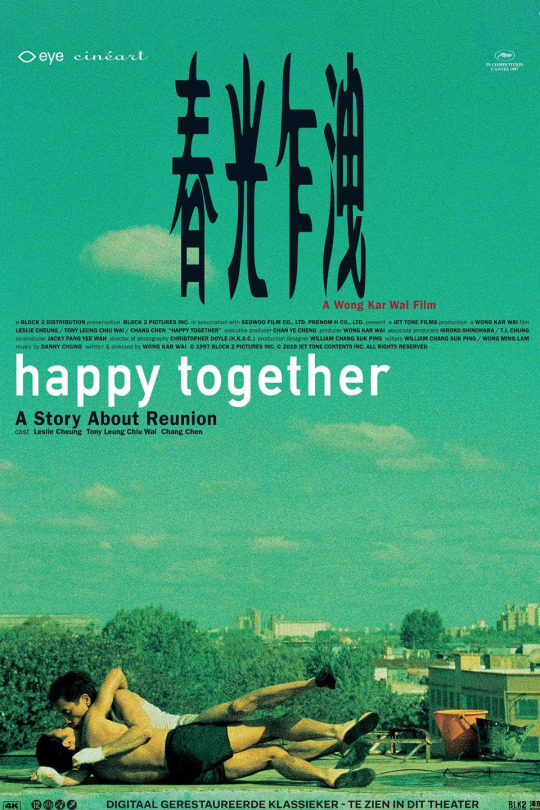
Wong Kar-Wai & Happy Together
For some background information, Wong Kar-Wai is a famous and insanely influential Hong Kong filmmaker. If you're a film nerd, you probably know who he is and recognize his style. If you like film and metas, I would recommend watching some of his stuff because afterwards, you'll realize just how much influence he still has on modern media, especially in Asia. Stylistically, he's known for rich color grading; thematic usage of music; an unending sense of nostalgia, heartbreak, and missed opportunities; and dialogue that mean nothing on the surface because everything meaningful is boiling just under, left unsaid (If you've watched Everything Everywhere, All At Once, the entire actress universe sequence was an homage to Wong Kar-Wai). His actors always do a phenomenal job because so much of what they need to portray can't be communicated through words. It makes sense why SandRay, aka FirstKhao, were chosen to represent Happy Together as they are the strongest actors out of the group.
Happy Together, simply summarized, is about two men, Ho Po-Wing and Lai Yiu-Fai, who are in a very tumultuous relationship. They end up in Argentina because they wanted to visit the waterfall that's on a lamp that they own. They get lost, end up using all their money, and have to figure out a way to get back to Hong Kong. While there, they break up, get back together, and break up again.
The movie was released in 1997 and is still ranked as one of the best queer movies of all time. The two main characters are played by Tony Leung and Leslie Cheung. You might recognize Tony Leung as Simu Liu's dad in Shang-Chi. Leslie Cheung was in Farewell, My Concubine, and was famously a bisexual man with a long term male partner. This is significant because it was virtually unheard of to be out and open at that time (he made his relationship public in 1997 though he had mentioned bisexuality in earlier years), especially in Hong Kong which was, and still is, very homophobic. Leslie received a lot of hate for his sexuality and androgyny. (If you're interested in learning more about Leslie as a queer Asian figure, this is a good video essay that goes over his work and his life).
Sand as Lai Yiu-Fai
Fai's, and in turn Sand's, character can be summed up by one line, "One thing I never told Ho Po-Wing was that I didn't want him to recover so fast. Those were our happiest days."
Both Fai and Sand are very static, straightforward characters. They stay above board for the most part and work a variety of jobs to survive. They have their morals about what is right and wrong, which unfortunately is both of their downfalls.
In Happy Together, Wing breaks up with Fai because he is bored with the relationship. He basically says, "I'm bored being with you. Let's break up. If we happen to meet again, we can try again." Then he leaves Fai stranded on the side of a highway.
Later, he reappears in Fai's life. The first encounter is a fight, much like Sand and Ray's first meeting in the bathroom. The second encounter is because Wing gets beaten up. He goes to Fai because he knows Fai will feel obligated to take care of him and he does. It becomes the beginning of their rekindled relationship.
Similarly, Sand has a strong sense of obligation. There are already metas out there about how Sand has a bit of a hero complex. He sees Ray too drunk to drive and he had to step in. He doesn't just take the keys and order a taxi. No, he takes the keys and drives Ray. Sand sees Ray being all sad and pathetic and he can't stop himself from helping. It makes him feel useful. It makes him feel needed.
Both of these men are caretakers. They show affection by providing care. Sand ends up cooking for Ray just as Fai cooks for Wing even when he's sick. As an added bonus, they both make fried rice.


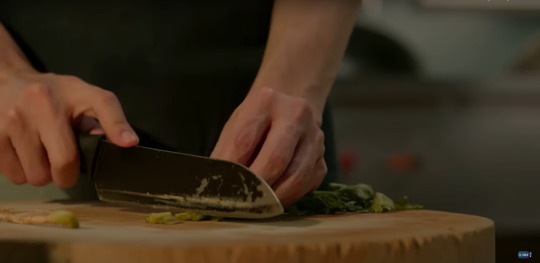
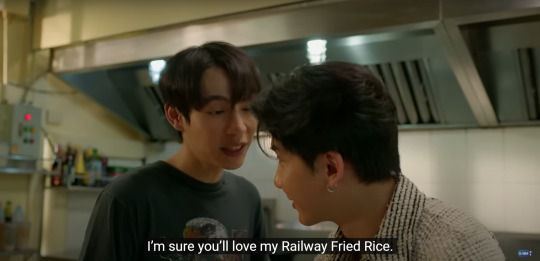
Both Sand and Fai are characters that stand completely still. Ray and Wing always know where to find them. Sand can always be found at YOLO and Fai is at his apartment. Because of this, Ray and Wing come and go as they please. They know that Sand and Fai will take them back...until they finally don't.
Ray as Ho Po-Wing
Starting on a base level, both characters are bratty, needy, promiscuous, spoiled, and selfish. But most importantly, they both share a love of fluffy cardigans.

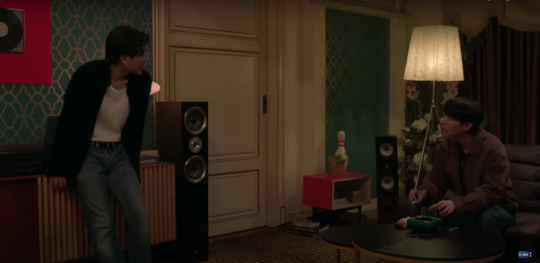
(I also have a theory they keep putting Ray in wife beaters as an homage to the 90's HK cinema style because otherwise...I just don't understand why, as a rich asshole, he's always in wife beaters. By Thai BL logic, he should be in shirts with too many buttons unbuttoned.)
Wing and Ray are both the ones controlling the pace and direction of the relationship. They come when they need someone to nurture their wounds, both physically and metaphorically. They leave when they're bored or have things they deem more important. They both initiate intimacy and won't take no for an answer.


Wing does this by first trying to join Fai on the couch and then chasing after him to the bed and begging him to let them sleep together.
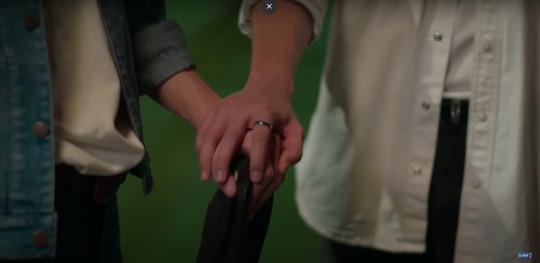
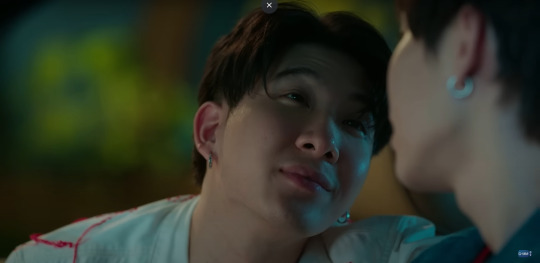
Ray does it by continuously getting Sand to get in the car with him and then using his puppy dog eyes.
They are both also very, very pouty.
Wing's line is "We could start over". He says it every time he comes back after he's the one that ends the relationship. Fai always fights taking him back, but he always does it anyway.
Ray doesn't really have a line yet (unless you count his "na na naa~"s) but he bats his eyelashes and so far Sand has given into him every time. Sand keeps trying to set boundaries, but the moment Ray begs a little bit, Sand crumbles like a house of cards and lets Ray have whatever he wants.
Relationship Parallels
Wong Kar-Wai is known for making movies about star crossed lovers who are meant for each other, but aren't meant to be together.
Like Wing and Fai, Sand and Ray fill in each other's cracks in a way that complements each other. However, because of the nature of the cracks themselves, them complementing each other is exactly what makes the relationship so toxic. One stays and one goes. One takes and one gives. One is steady and one is flighty.
Most of what I wanted to say about the parallels between their relationships is in the character comparison. What I'm more interested in is the future of SandRay's relationship, especially if they continue to parallel Wing and Fai's in Happy Together.
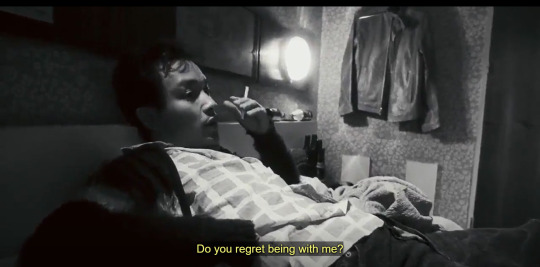



Obviously, Wing and Fai don't end up together at the end. It wouldn't be a Wong Kar-Wai movie if they did. What is interesting is that Fai's relationship with Wing eventually pushes him into becoming something angry and spiteful. Once Wing heals, Fai knows that he'll become bored and want to leave. In an attempt to get him to stay, he steals and hides Wing's passport which is insane because they are both gay men stuck in a foreign country where they don't speak the language.
Wing, of course, leaves anyway.
There is also a third character, Chang, whom Fai ended up liking. These new feelings are what eventually pushes Fai to leave Argentina and move on from Wing and move on with his life.
The question is, if SandRay follows that same path as Happy Together, what will be the passport that Sand tries to hold over Ray and who will be Sand's Chang?
Stylistic Parallels
Smoking
Making Ray and Sand smoke is definitely an homage to Happy Together with the added bonus of being a metaphor. For the most part, we rarely see characters, especially main characters, smoke in Asian media because smoking is reserved for 'bad' characters.
Cigarettes in Happy Together represent boredom. Fai and Wing smoke at the beginning before they rekindle their relationship because they are just moving through life. Once Fai and Wing get back together, cigarettes stop making an appearance. It isn't until their relationship started deteriorating that we see the men smoking again.
This can also be said about Sand Ray's relationship. They started their 'involvement' with cigarettes. However, the last time we actually see them smoking is in ep 2 right before they hook-up. Since then, we have not seen either of them smoking. This probably means that we'll see one or both of them smoking again when their relationship starts to break down.
(In the preview for ep 5, there is an ashtray in the background on the balcony so let's see if Boston finding out about them is a catalyst for them to start breaking down.)
And of course, there is the added homoeroticism of asking for a light.
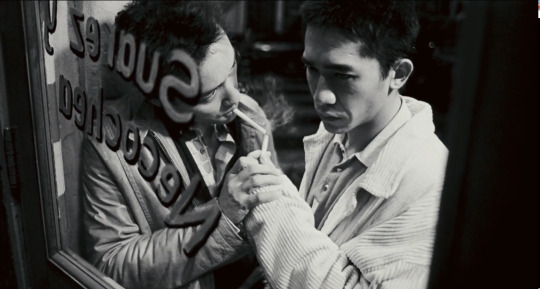

Ray's Opening and Closing Scenes
Ray's episode is really what made me go "I see you P'Jojo".
Ray's episode starts with a shot of him isolated and in emotional pain. The camera is claustrophobically close and it keeps moving around. He has a little voiceover opening. It's calm, it's contemplative, it's a little existential, and it is irrevocably sad. If that is not a Wong Kar-Wai staple, then idk what is. Even the song that starts playing gives me 80s, 90s Cantopop vibes.
Ray talks about how Mew being his emergency contact and the one he goes to. Fai talks about how Wing always comes back to him and says "Let's start over".


The movie and the episode ends with both of them once again isolated, alone. They've been through an emotional journey and they've technically moved on. But there's always the idea of not being able to fully let go in Wong Kar-Wai's movie. So just like how Fai has physically removed himself from Wing, but not emotionally, has Ray actually fully removed himself from Mew?
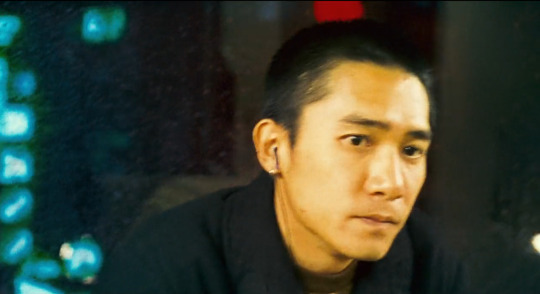

Cinematography
Then there's just a collection of scenes that reminded me very heavily of Happy Together and Wong Kar-Wai's style. I would have added pictures from his other movies for comparison, but Tumblr only lets me put 30 images in a post and I don't want to make a 2nd post.
This scene is specifically from the 1st trailer so I hope they keep it in the show.
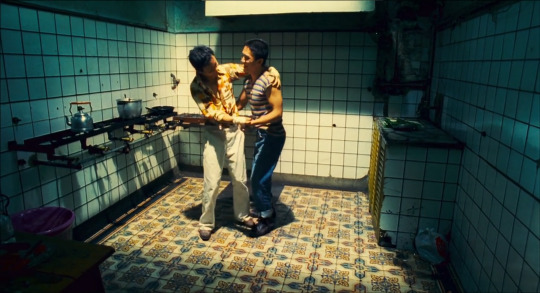

This one I call the inevitability of falling. Both Sand and Fai realize they're fully committed to their decision to take care of Ray and Wing here.


The end title card
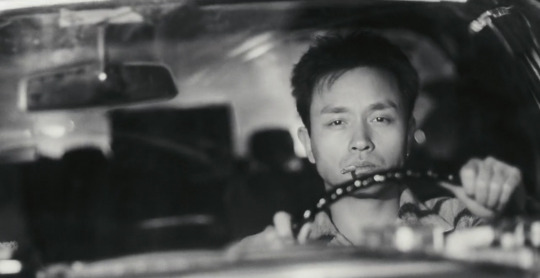

Actually, all of the end title cards give very Wong Kar-Wai vibes. Look at that saturated, neon color grading. Look at the elongated shots. The intense feeling of isolation.


I'm assuming we'll get all the characters at one point, but so far it looks like the end credit cards indicate who the narrator of each episode is.
Anyway, that's it for me! Sorry it was so long and rambling. I tried to organize my thoughts but as I was thinking, more thoughts would pop up and I'd get distracted. If you made it this far, thanks for reading!
#ofts#only friends the series#only friends series#sandray#ofts meta#only friends meta#happy together#i have to post this now because if i dont ill keep writing and ive already spent too much time on this#if anyone has other screenshot comparisons post them#because there are a few more scenes that give me major wong kar-wai vibes#but im too tired to look for them now
424 notes
·
View notes
Text
The animators were Kurahi shippers and you can’t change my mind: exhibit A
Enthusiastic reading-too-much-Kurahi-but-not-really into the animation~
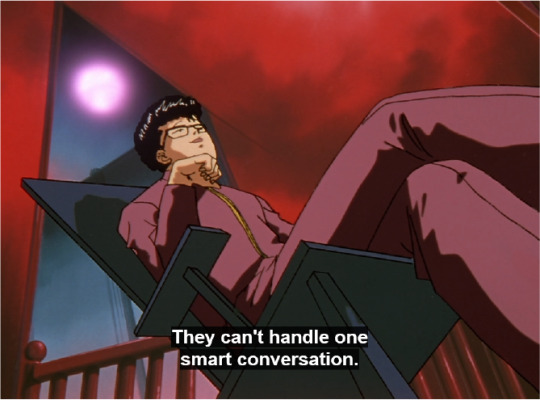
From episodes 68 & 69, “Setting the Trap” and “The Power of Taboo”
So anyone creative that writes or draws or what have you can tell you that everything actually is intentional, and by that I mean, every word you pick to write and every design or illustration you make is a choice. We make choices, we decide, and then those things are up for interpretation.
All of that is to say: I think these animators were kurahi shippers or something man, there's an interesting visual in these two episodes that happens repeatedly. pls don’t judge me for my intense meta bullshit that’s about occur lol
When Kaito is about to take Hiei’s soul, he looks down at him, and we see a violet colored flash in his glasses.
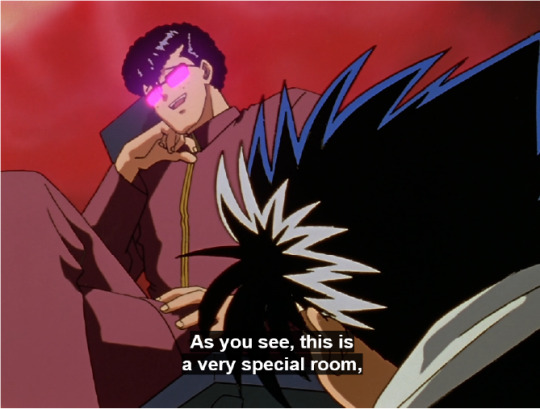
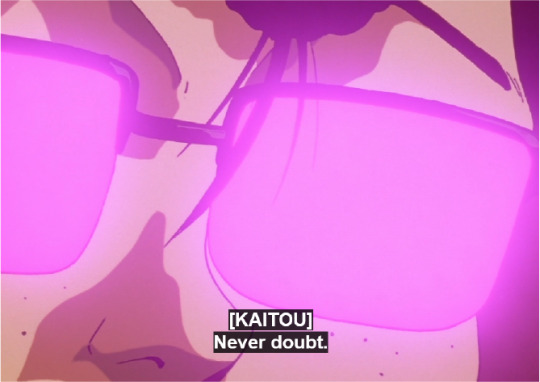
After he takes his soul, it’s encased in that same shade of purple. We know from earlier episodes and later on when their souls are returned that souls don’t have a color, they’re just white/translucent, so that means Kaito color-coded the souls by his own volition. Purple for Hiei, blue for Botan, and yellow for Kuwabara.

What’s interesting is…this purple color/flashes of purple light don’t go away. They’re present during Kurama’s battle of wits with Kaito and their negotiation of the terms.
Now someone might say, “well Hiei’s soul is positioned on the rightmost side and the purple visually stands out better, it makes sense it would show, it doesn’t mean anything.” And perhaps they’re right, but I don’t think so.
Again, these things are intentional choices, regardless of whether or not what they mean is agreed upon. They chose to make Hiei’s that color, they chose to position it to the side, and they chose to use it for this visual effect.
Most important to note: this visual choice is only done for Hiei’s color, purple. There’s no ambient light in the room and it’s the exact same color, ergo very intentionally done. They don’t rotate between colors, they never show flashes of blue or yellow or all three—it’s only purple.
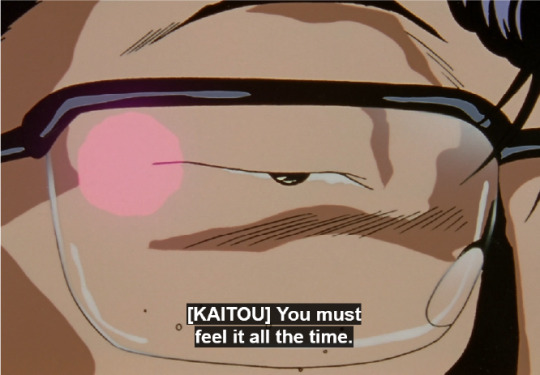
⬆️ here for example. Arguably we should be able to see the blue and yellow reflected in his glasses, too. But we don’t. Just that fuchsia color. Just Hiei’s soul.
So what does it mean (to me)?
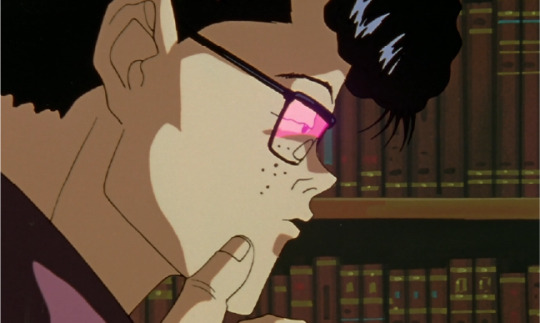
I think it means that Hiei is most important to him, and somehow Kaito has clocked that. Hiei’s soul is the one reflected in Kaito’s glasses while they negotiate the rules of their game.
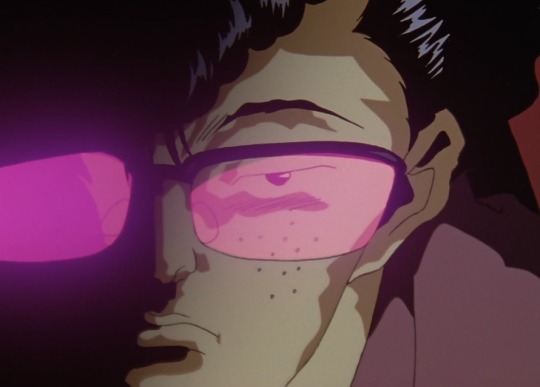
And it’s only reflected/shown in his eyes when he’s looking at kurama (other than Hiei prior to the soul stealing!), not anywhere in the room, which is what makes me think that Kaito knows how significant the relationship between Kurama and Hiei is. He (literally in a visual sense) can see it. These flashes happen the most/almost exclusively during this scene—as if he’s dangling Hiei’s soul specifically to bait Kurama into playing his game.
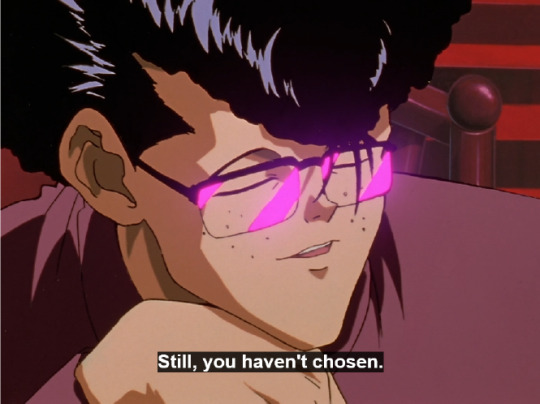
It’s symbolic of how meaningful the relationship is to him, because it’s shown like it’s the bargaining chip to make the game happen. When he taunts Kurama that he still hasn’t made his choice, the reflection is there again. The significance is only emphasized by the fact that it doesn’t happen with anyone else’s soul/color.
Additionally, I like that Kaito’s hand is hovering over Hiei’s soul when Kurama threatens to erase him from reality. I don’t think this is strong evidence or anything, but it compliments my theory here quite nicely lol.
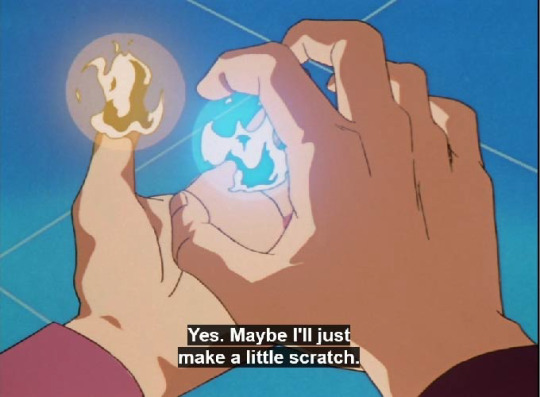
Bonus (aka this doesn’t really have evidentiary support but hey it rolls with this pretty well): look at how mad Kurama is after Hiei’s soul is taken. Angry husband.

TLDR: they knew wtf they were doing with this man YOU CANT MAKE ME BELIEVE OTHERWISE
#yu yu hakusho#yyh#kurahi#yyh meta#yyh headcanons#musings.txt#Hiei#kurahiei#Kurama x Hiei#fan theory#yuu kaito#i miss literature class#can you tell
168 notes
·
View notes
Text
Dreblr Survey Results!
First of all, thanks to everyone who took part in this survey. There were 152 responses in total! This post just covers the statistical side of things; there will be more posts later for the long response questions.

Most popular characters
Dream (95.4% of voters)
Technoblade (84.9% of voters)
DreamXD (46.1% of voters)
Yeah, of course Dream was going to win this one, it's literally dreblr. But Techno landslided second place. No one else is even close. You've got to love that Lil Nas X got as many votes as Aimsey, Boomer, Eryn, Lazar and Vikkstar combined, and he wasn't even one of the options.


Most unpopular characters
Tommy (45.9% of voters)
Quackity (34.1% of voters)
Jack (28.1% of voters)
Quackity. My poor Quackity. This is so sad (<- unbiased). These results weren't quite as unanimous though, and a few characters avoided any hatred! I find it interesting that Techno got zero votes after doing so well in the last question. People just really like Techno.
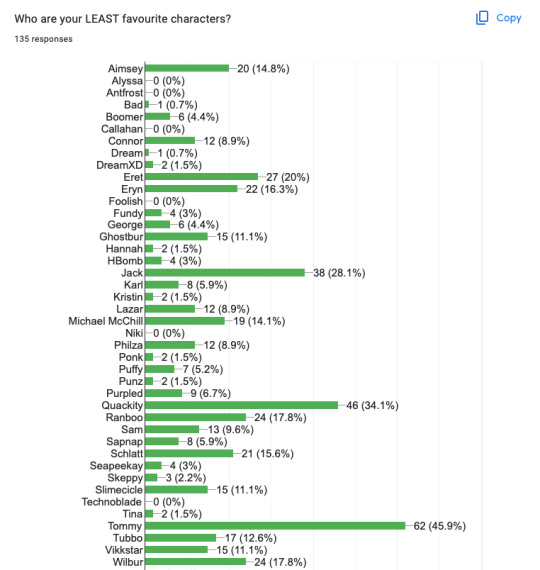

Most popular arcs
Prison (72.7% of voters)
Doomsday & Disc War Finale (66.0% of voters)
Post-Prison (48.7% of voters)
Not really surprising that the prison arc won, since we apparently all thrive on suffering. But it's always nice to see the MCC prison roleplay making an appearance.

Most popular ships
Drunz (60.4% of voters)
Dreamnoblade (58.3% of voters)
DNF (54.9% of voters)
Let it be known that dreamnoblade was winning up until the last second. Alas, you were not powerful enough. And neither were awesamdreamers? I thought y'all ran this town? There were a lot of other suggestions for ships: some DNN, some fundywastaken, some Dream/XD, some awesamdreamity. My personal favourites are "c!DreamxRest&Relaxation" and "Dream/a good night's sleep," you guys were onto something.

Most popular duos
Dream & Technoblade (94.7% of voters)
Dream & Punz (63.2% of voters)
Dream & Sapnap (45.4% of voters)
I really can't adequately express how insane it is to me that Dream & Techno got that much of the vote. Like. Look at it. Only 8 people in this whole survey didn't put them as a favourite duo. That's absurd. And again, Dream & Sam missing top 3 by one vote.
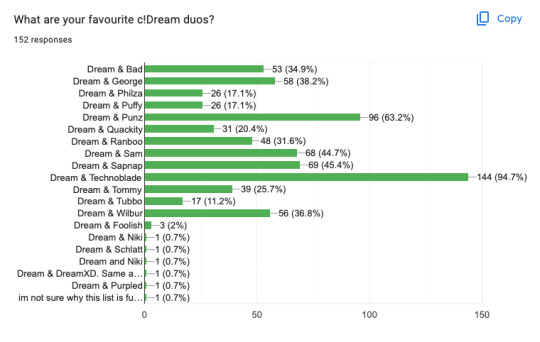
Most popular factions
Syndicate (76.5% of voters)
Greater Dream SMP (51.0% of voters)
Eggpire (32.9% of voters)
Again. Look at the difference between first and second! If this isn't proof that Technoblade never dies, I don't know what is. Shoutout to the people who put the Antarctic Empire, 2b2t, and "Dream and all the traitors he pulled out of nowhere."

Most popular places
Arctic Commune (64.9% of voters)
Pandora's Vault (63.6% of voters)
Community House (58.3% of voters)
Listen, you don't have to tell me, I already know I forgot to put Church Prime. I'm very aware of my stupidity. But these results—do you even know how strong you have to be to overpower Pandora's Vault? In dreblr? Damn. That was also a last-minute thing, Pandora's Vault was winning.
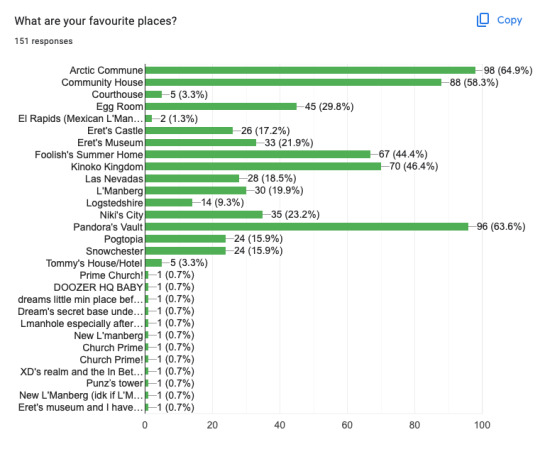
Fandom behaviors
I'll admit, I didn't give the best options for this question, so thanks to everyone who wrote their own response. Apparently we're all big readers, so that's nice for us! We're also more likely to be a writer than an artist, but far fewer of us are writing meta. All in all, this looks like a pretty good spread!
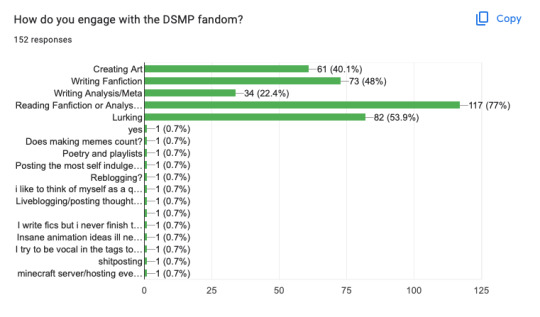
Joining the fandom
The most popular time to start watching the dsmp was between New L'Manberg and the Disc War Finale, but honestly, it's split into fairly even quarters between the main "seasons" the server was active. To those who joined after the finale streams, hi! I hope you're enjoying your stay!
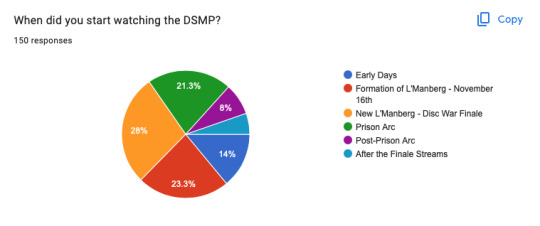
Thoughts on the finale streams
I'm actually a little blown away that no one rated the finale streams a 1. Not a single person. There's nothing more I can say other than this response is overwhelmingly positive.

Is the fandom dying?
It looks like the answer is no! 82.9% of us are still moderately interested in the dsmp or more, and for almost a third of us, it's consuming every part of our brain. I don't know about you, but for me, this is actually something I really needed to see.
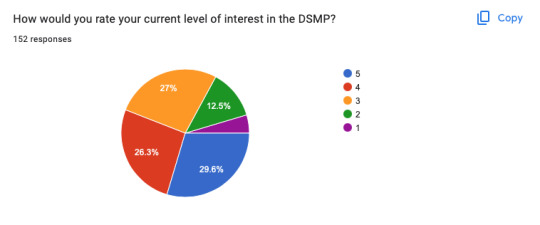
That's all for this post, but there will be more results soon for the questions with longer responses. I'd strongly recommend sticking around for that, some of them are hilarious. Well done for making it through the stats!
As an aside, well done to the 35 people brave enough to put their name to what they said in this survey. Because some of what they said was *ahem* very interesting.
236 notes
·
View notes
Text
So I was thinking about pirates of the Caribbean, and each characters unique moral code and way of approaching life, as one does, when I remembered a particular scene about our beloved James Norrington... the very first scene in which Jack and James meet. Now, as a long time Sparrington shipper, I adore the Sparrington fandoms adopted head canon of Jack's compass pointing directly at Jack when James is holding it as having a romantic connotation too it, but this is Disney we're talking about, and a Disney from 20 years ago at that, so it is of course just a head canon. And while it is a beloved head canon, I will always be a writer before a shipper, and what that scene says about Norrington from a writer's perspective is far too juicy not to share... So buckle up for a very long meta post about who James Norrington is as a person, and how it was set up in this scene(and later reinforced in the second and third movie). This is my first real meta post, and I'm very excited for it, so let's jump right in.
First of all, the compass scene.
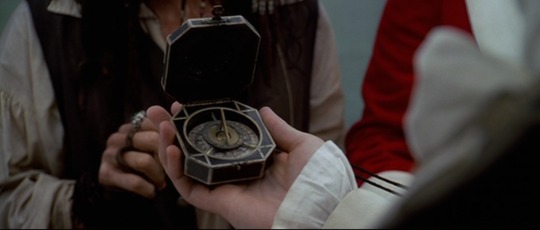
As we can clearly see in the image above, since the red line that points to the object of the holder's desires is no where to be seen, its relatively easy to conclude that it's hidden from our view by the sun dial in the middle, and thusly is pointing directly at Jack. Elizabeth is off to James's right, and no one is standing behind Jack, so unless the compass was pointing at something in the far off distance that just so happened to be in Jack's general direction(unlikely) its pretty clear what(or who) the compass is pointing at. For most potc fans, this is fairly standard knowledge. But it's what this fact says about Norrington's character that I'd like to focus on. After all, what does it say about a man that a compass that shows you what you desire most is pointing at a pirate, and the very face of piracy at that, instead of your canonical love interest, when you're a Commodore of the Navy? As stated above, Sparrington shippers often point at this scene as proof that James has a bit of a pash on the ruggedly handsome pirate, or at the very least, a thing for men. But from a writer's perspective, this just simply isn't the case, and not because the writer's in this instance are the notoriously homophobic corporation we call Disney. The reason why this is so unlikely from a writing perspective is because given the context clues, we as an audience are meant to draw the conclusion that this is the first time that they meet(I have heard rumors of them meeting as children in the books, but having never read them, and focusing only on the movies, I'm not including that in this post). And since this is the first time they've met, it's highly unlikely that the compass is pointing at Jack because James has a bit of a thing for him. Even if James has heard of Jack's many exploits, he does not truly know the man behind the legend, so having romantic feelings for the pirate at this point in time just isn't believable. And even if James was a closeted gay/bi man, it's still unlikely that the compass would be pointing at Jack of all the men around the Commodore(of which there is a lot, some of whom he is incredibly close with) seeing as Jack is the poster boy of piracy, and at this point in the movie it's made abundantly clear that James vehemently detests the notion and all who practice it. If James were to be holding the compass in Jack's vicinity in later movies and it still pointed at the pirate, an argument could definitely be made that it was because he had developed feelings for Jack, but for their first meeting, it's just not realistic. So it's much more likely that the reason the compass is pointing at Jack is because of James's desire to send every pirate he meets to "a quick drop and a sudden stop" as he so eloquently put it to a young Elizabeth. This is further reinforced in the third movie when it is revealed that Beckett's desire to have Jack dead at his feet would prevent him from using the compass to find Shipwreck Cove if the pirate was not already at the aforementioned location, or, well, dead. This is again, relatively common knowledge. But like I said before, it's what this fact says about James that is the whole point of this post... and that is that James cares more about his career than anything else, even the woman he claims to love. Now for some, that statement alone might seem like a pretty obvious conclusion, but it's how this scene subtlety sets up this core aspect of Norrington's character before we even truly get to know who he is, and how it's brought to it's full height in the second movie, and the core aspect of his redemption and subsequent death in the third that I'd really like to talk about. Which brings us to the next segment of this post...
How James lost his commission to the navy...
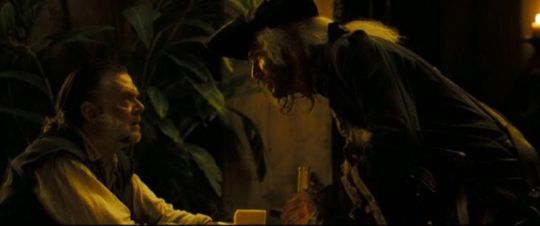
And how he got it back
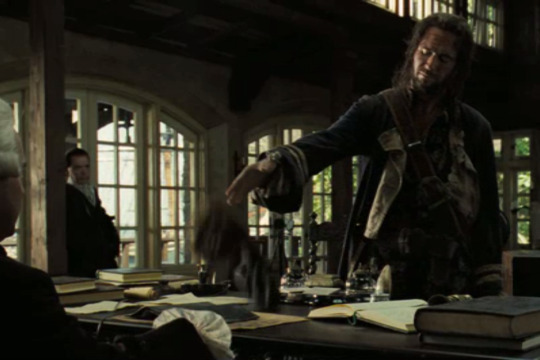
So let's start off with how James lost his commission... it's a story we all know pretty well, and one he tells to Gibbs in the scene shown above, when he plans to either join Jack's crew or get revenge on the man that(he believes) ruined his life. After Jack's escape in the first movie, James grew obsessed with capturing the pirate, so much so that he foolishly followed the Black Pearl into a hurricane, resulting in the sinking of the Dauntless, and the loss of countless lives that had been aboard the vessel. It's unclear aside from James himself who had been on the ship at the time, and who did or did not survive, but the death toll was heavy, with most, if not everyone who wasn't James, having perished in the storm. While it is not the most extreme example(which we'll get too in just a bit), this is a pretty clear example of James prioritizing his career above everything else, even reason and logic. And all just to capture a singular pirate, even at the cost of his own ship and crew, and rather ironically, the very career that he had been so desperately trying to hold onto in the first place. Which brings us to the next scene I'd like to discuss... James stealing the heart of Davy Jones. This moment is the absolute peak of this part of James's character. This is the moment where James takes his obsessive need for his career to the max. This is the moment where James truly prioritizes his career above everything else, even the woman he claims to love(and for Sparrington shippers, above the man he's reluctantly come to care about). At this point in time, when James decides to take the heart for himself to regain his old station, he's been on the Black Pearl long enough to know the full situation. That Jack is in some kind of trouble with Davy Jones, and that if Jack doesn't use the heart to bargain for his freedom, then the Kraken will hunt Jack, and subsequently the Black Pearl, down until he and everyone aboard are dead. And that includes Elizabeth. And yet, despite knowing that stealing the heart would basically mean sealing Elizabeth's death, he still decided to do so. Sure, the argument could be made that he thought Elizabeth would be able to escape somehow, but the chances of her dying at sea, or some other terrible fate befalling her before she could safely make it back to civilization would have been highly likely. Of course we as an audience know that this isn't the case, but James does not. So essentially, James was so obsessed with his career, and maintaining the image of the honorable Commodore that he didn't even truly register that he was putting Elizabeth, the woman he loves and has been trying so desperately to woo for the past two movies, in danger. And he won't fully realize the consequences of his actions until the third movie, in a deleted scene no less(I swear when I find whoever decided to delete some of the most important scenes to James's character...), when Davy Jones informs Governor Swann of his daughters untimely demise on the Black Pearl. Of course, almost immediately afterwards, Beckett retcons that statement by informing the Governor that Elizabeth was recently seen in Singapore, but for a few minutes, James has to sit with the fact that Elizabeth was dead, and it was his fault. And even after learning that she was in fact still alive, James has now finally come to the realization that if she had still been on the Black Pearl when it sank with its Captain, he would've been the one to send her to her death. And for Sparrington shippers, James has to sit with the unavoidable fact that he was the reason Jack had died(even if the pirate does come back), despite the fact that it was Elizabeth's betrayal that was the final nail in Jack's coffin, since she wouldn't have had to do that if the Kraken wasn't after them in the first place. Which brings us to the final scene I'd like to discuss...
James choosing a side, and paying the price

Now, before we fully delve into this scene, I'd like to take a moment to talk about James's own perception of himself, and his relationship with honor and integrity. From the very first scene in which we meet James Norrington, we are made aware that he has a strong moral compass. He firmly believes piracy is evil, and that all who partake in piracy deserve a swift end. He perceives his Commodore persona as being the paragon of honor and integrity, and the sole arbiter of justice. We can infer from the line "By remembering that I serve others, Sparrow, not just myself" that James does have honorable intentions when ridding the world of pirates, that being protecting the innocent citizens under his care, but as seen once again in the first time James and Jack meet, wherein James adamantly tries to arrest Jack despite the fact the fact that pirate had just saved Elizabeth's life, his actions to achieve that goal are not always quite as honorable as his intentions are. This is especially highlighted once again when James gave Beckett the heart of Davy Jones. James's intentions here were once again rooted in honor and integrity - he believes that the only way to keep people safe from pirates is too return to his old station, to the image of honor and integrity he had built around the title of Commodore, and the only way to return to his old station is to give Beckett the heart. But the action itself was far from honorable, seeing as James had to betray the woman he loved just to obtain the heart, and that he was now putting it into the hands of a dangerously unstable individual who planned on using it to commit mass genocide.
And now, we finally get to the scene above... Of course, it's made clear throughout his scenes in the third movie leading up to this one that James is already starting to regret giving Beckett the heart after seeing the damage being caused, but since Beckett is targeting pirates specifically(although we as an audience know that Beckett's definition of pirate is very loose) James figures that the ends justify the means, as he often does in situations regarding piracy. It is not until his reunion with Elizabeth, where he learns that Governor Swann is dead, and that Beckett lied to him about the Governor's whereabouts, that James truly realizes the enormity of his mistake. It is in this moment that James has a sudden realization that fundamentally shakes him to his core, and is the reason behind his change of heart later on. He realizes that the honorable Commodore persona that he had tried to cultivate and keep a hold of for so long had never been truly honorable at all, and that by giving Beckett the heart of Davy Jones, he had effectively tied the noose around the neck of his own honor and integrity, as well as the necks of hundreds, if not thousands of innocent people, with his own hands. And as that one vine goes, this was the moment James knew, he fucked up. Which leads to his decision to change sides in an attempt to redeem himself, and his subsequent death in the process. Of course, part of James's reason for helping Elizabeth escape was that he does care for her, but given everything I've detailed about him so far, I think it's safe to say the main reason that James decided to help Elizabeth and her crew was because he wanted to undo the damage he had done, and he had faith that Elizabeth, Will, and Jack would have some sort of plan to defeat Beckett, and stop any further damage to come from his mistake. And now, for his death scene itself... As much as I love the idea of James surviving and joining the pirates(whether at Elizabeth's side or Jack's is unimportant), I firmly believe that his death was a necessary end of this part of his character arc, and that if he were to survive he would still have to go through a major ego death for this part of his character arc to end properly. Because as Bill turner drives that wooden pike into James's gut, it's not just the physical death of his body, but also the metaphorical death of Admiral James Norrington, and the ideals that James had used to build the persona out of. So even if James survived, the Admiral would still have to meet his metaphorical end, thusly causing James to lose a core part of himself that had been guiding most his decisions so far, in the process, which would start the next part of his character arc, where he would have to deal with the loss of a key part of his personality, and rebuild himself from the ground up to finally, truly become the image of honor and integrity he had envisioned from the beginning.
And that concludes this very long post. I could probably wax enough poetics about this aspect of James's character to write a short novel, but I've said everything important to this post, and if I go on any longer, I'm likely to start repeating myself lol. Thank you for reading, and feel free to share your thoughts in the comments or a reblog! I will always love hearing more about our polished peacock <3
#pirates of the caribbean#james norrington#jack sparrow#elizabeth swann#cutler beckett#davy jones#sparrington#norribeth#meta#potc meta#a character study of james norrington
165 notes
·
View notes
Text
Splatoon 3 Version 6.0 Patch Notes Breakdown
Been a little bit since I did one of these, but Nintendo released the Chill Season 2023 patch notes about three hour ago, and while in terms of balance changes this is one of the smallest patches ever, it's got a ton of quality-of-life changes, so let's dig in, shall we?
So let's start from the top. In terms of new content, this patch includes a new catalog, two new stages (Robo ROM-en and Bluefin Depot), two new Specials (Splattercolor Screen and Triple Splashdown), nine new weapons, two new multiplayer songs, the new King Salmonid Megalodontia, and eleven new Tableturf cards.
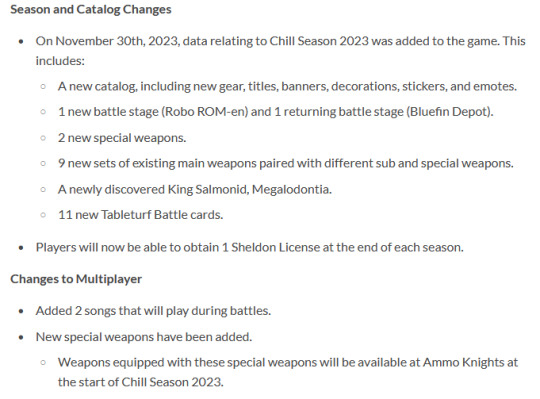
Additionally, you'll note that they're including a line about giving you one Sheldon License at the end of each season. This is actually really relevant to a change coming down in line, so tuck that in the back of your mind for later.

The balance changes are all buffs, but they're relatively minor, and only six Main weapons and one Special are seeing any changes this time around.

Starting off, .96 Gal is having its ink efficiency buffed by 8%. It currently gets 40 shots on a full ink tank, so I wager this increases that number by about 5-10, but it's 5 AM my time at time of writing and I am bad at math, so I don't know for sure.

Ranged Blaster's explosions get a 15% paint buff. Note that this applies only to the final explosion and not the trail, so it's not a straight 15% paint buff.

Dread Wringer gets a 10% ink efficiency buff, and since it currently has ten sloshes on a full tank, that increases that number to eleven.

And finally, for Main Weapon changes the Heavy Edit Splatling now paints more. Unlike the Ranged Blaster's paint buff this is a lot harder to gauge, but Heavy Edit's paint can be kind of spotty and inefficient, so this is undoubtedly a good thing for it.
After that, we've got only two points-for-Special changes.

Jet Squelcher and L-3 Nozzlenose both get some points shaved off their Specials, taking their Ink Vac and Crab Tank to 180p and 190p respectively. On one hand, I am biased and hate the Jet Squelcher, and I think this buff was completely unwarranted and unnecessary, but on the other hand I love the L-3 and want only good things in life for it, so they balance each other out, in my book.

And, for the final balance change of the entire patch, we've got a Reefslider buff, as it now makes you invulnerable during its startup 13 frames faster. The thing about this change is that like, it's a buff, and that is good, but the problem Reefslider has is not getting the Special off, it's that you very rarely survive the aftermath of using it, and this does nothing to solve that. With Triple Splashdown on the horizon I think things might be rough for this Special in the future.
And that's all of the balance changes! There being so few of them indicate two things to me: That Nintendo is overall happy with the the state of the game, and that they are wary of touching anything unless they have to. And one hand I get it, after all, competitive players are currently saying that there really isn't a meta at the moment, just picking weapons you're good at and playing well, and that's probably not an environment you want to shake up too much. But on the other hand, there are a lot of things like Line Marker, Undercover Brella, and Reefslider to name a few, that could really do with some sprucing up to help them keep up with the just the middle of the pack. I think raising the bottom bar a bit higher would be to everyone's benefit.
But we've got two Specials being added, so I suppose now's not the time to rock the boat too much. We'll see how things have shaken out come the mid-season patch in January.
But the balance changes are a very small part of these patch notes, and nowhere near the most interesting, so let's keep moving on.
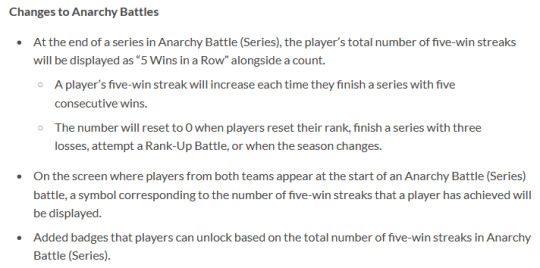
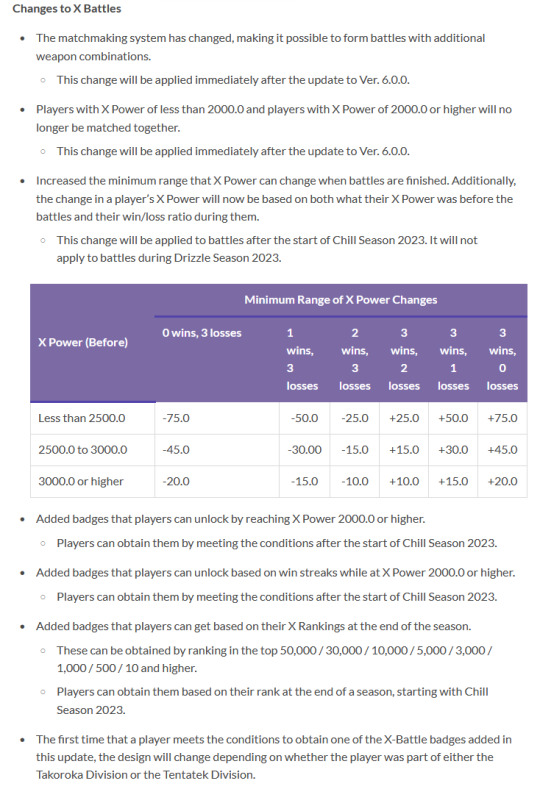
Anarchy Series and X Battles are receiving a whole slew of changes, the most prominent of which are some new badge rewards for win streaks and attaining high X Rankings. Additionally, matchmaking in X Battles is being changed to more strictly separate people with high and low X Ranks, as well as allowing more team compositions. To cut a long story short, weapons have a set of internal values that the game uses during matchmaking to try and balance the team compositions. Matchmaking in high-power X Rank infamously takes a very long time, so I have to imagine that this change aims to speed things up by making the matchmaking more lenient on that front.
Salmon Run, in addition to the new King Salmonid, is getting some significant changes, starting with some changes to the Specials:
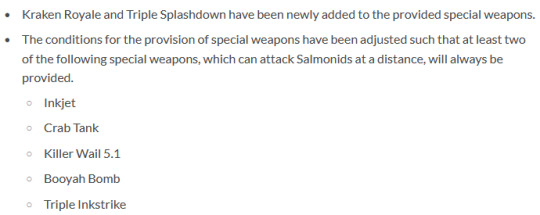
Kraken Royale and Triple Splashdown are being added to the pool of available Specials. Additionally, Mr. Grizz has finally agreed to always provide at least two workers on every team with a long-range Special to handle all the pesky Stingers and Flyfish. Be sure to thank your local union representative the next chance you get.

This change is particularly spicy. Your Salmon Run stage badges will now boost your starting difficulty on their respective stages, adding more incentive to play beyond the two superbonuses, as well as making the grind for future badges easier. This certainly gives me more motivation to go for those VP 400+ badges.

You'll now be able to tell what King Salmonid is present during each Shift, and the Salmometer will change to match it, as well. Can you believe they didn't change that when they added Horrorboros?
Also I am curious what this means for those Shifts where the King Salmonid was random. Will the Salmometer become a question mark? Are they not gonna do those anymore? We'll have to wait and see.
But this next change, is a big one, and it's for, what else, Big Run:

Big Run trophy requirements will now be set in advance, and no longer scale off top 50%, 20% and 5% player results.
I am in two minds about this change. On one hand, I always thought that people complaining about overfishers in Big Run were kind of petulant and entitled, especially when the rewards were as minor as locker decorations and badges. Maybe that's mean-spirited of me, but there was never a way for me to read it as anything but people demanding to be given the same reward as the people working the hardest without putting in the effort themselves.
But on the other hand, the 5% cutoff has been steadily rising as overall Big Run participation decreased, which is just a natural result of time passing and casual players falling off the game, nothing weird there, but this means that the top becomes more stacked, further disincentivizing casual players as getting even the bronze trophies becomes harder and harder for them. Giving the players much clearer and more achievable goals will likely serve to pull a lot of people back into Big Runs, and that is undoubtedly a good thing.
And hey, I said the rewards weren't worth getting upset over, and by that same metric, I don't think it's worth getting upset over more people getting them, either. All the better, if it makes more folks happy. And as for the people who do want to grind their hearts out, well:

There's still some recognition for that, too.
So that's the gist of the Salmon Run changes, so let's finish up with some miscellaneous changes.
Remember how I told you to keep that bonus Sheldon's License in mind for later?

Players who own every currently available weapon will now be able to trade extra licenses in for Shell-Out Tokens. In other words, that extra license serves as a failsafe so you don't lock yourself out of buying future weapons by spending all your licenses on gacha rolls.

The Splatfest Battle Pro queue is receiving the same matchmaking changes as X, presumably for much the same reasons.
And finally, the most important change of all:

WANDERCRUST IS BACK!!! YEAH BABY!!!! WOO!!!
141 notes
·
View notes
Text
What we miss when we don't talk about friendship (in MDZS)
I'd like to open with the statement that this is not about shipping -- none of my thesis is to say "don't ship this" or "this ship isn't real." People can and have shipped whatever the hell they want and should continue to do so for as long as it makes you happy. It's not even a question of "sure you can ship it but it's not CANON," because the MXTX canon is wonderfully good at being ambiguous and supporting multiple interpretations.
What this thesis is to say is that some of these themes and motifs to explore are about friendship, and they don't tend to get talked about much, because people are mostly focused on the romantic and sexual dimensions of a dynamic. Romantic and sexual dimensions are great, but they don't annihilate or even subsume platonic dimensions -- yes, sometimes you can be a lover and a friend, but sometimes you can just be a friend and not a lover and that's no less important. As a post I saw recently said which stuck with me -- don't remember the poster, alas, but it was something in the vein of -- "it's not about the intensity of the relationship, but the flavor of it." Platonic character dynamics can be just as obsessive and consuming as romantic dynamics, they can be discussed and analyzed separately without needing to invalidate romantic and sexual dynamics.
So! That disclaimer aside, let's talk about: FRIENDSHIP IN MDZS, and what we miss when we don't talk about friendship as a dynamic in this story separate from romantic and sexual interest. Friendship shows up repeatedly in this story with its own sub-plots and arcs and undercurrents and hazards separate from the romance that's going on, and it's mostly going on with the Lans.
Part 1: Lan Xichen and friendship
A cornerstone of this analysis has to do with a meta post I read very early on in the fandom about the Lans when viewed through a Confucian lens. Lan Qiren in particular is a very, very Confucian character, and he raised his nephews to those traditions and values. The pertinent one here is the topic of the "Five relationships" which outline the relationships that a man of authority can expect to have throughout his lifetime: self to ancestors, self to descendents, self to authorities and subordinates, self to marriage partners, and self to friends. Each one comes with a set of strictures and requirements which when added up combine to a world that is very, very emotionally taxing and extremely short on interpersonal and emotional support. He is expected to obey and submit to guidance from his seniors, but he can't ask them for help. He is expected to lead and govern his subjects, but he can never be wrong or show weakness or doubt. It's especially important, I think, that Lan Xichen is raised to expect that even any romantic relationship he might have (read: marriage to a woman) would not actually be emotionally supportive to him in any meaningful way; it would be another set of obligations to uphold, another place he would be expected to be remote and poised and never show weakness or ask for help.
The exception is friendship. Friendship is the only relationship structure Lan Xichen can have in his life that has any hope of actually being nurturing and emotionally supporting to him, a place he can let down his guard and ask for help with the expectation of receiving it. It becomes very clear from very early on that friendship means everything to Lan Xichen as a character. He enters the story with a strong, supportive friendship with one of the only true peers a man of station can have (Nie Mingjue) and it's clear that this has formatively set his expectation of what a friendship can and should be. Lan Xichen really wants to be the Friendship Is Magic guy. He believes that friendship is the best way to solve problems, and that everybody would be able to solve their problems if only they had a friendship like his, and that belief is a lot of what runs him into a meat grinder later in the story. He thinks that Nie Mingjue and Jin Guangyao are capable of maintaining a friendship post-war, and does not understand why they cannot, and his attempts to friend-matchmake the two of them ultimately lead both to disaster.
Part 2: Lan Wangji and friendship
The header says Lan Wangji, but this is actually about Lan Xichen again, and about Wei Wuxian. A pretty common joke in the fandom is that Lan Xichen is "the #1 WangXian shipper," that he recognizes Lan Wangji's sexual and romantic attraction to Wei Wuxian from very early on and supports him in pursuing such a relationship. It's a nice joke, but I think it misses the mark, because the looming specter of their parents' disastrous and traumatic marriage means that Lan Xichen would never approach the idea of his brother entering into a romantic relationship so cavalierly. (Lan Qiren, in some ways, had a clearer notion of what shape Lan Wangji's interest in Wei Wuxian had the potential to be than Lan Xichen did, perhaps because he doesn't have the same obsession with friendship; if he has any close friendships of his own, we're not shown them.)
Lan Xichen is not encouraging Lan Wangji to have a romantic summer fling. Lan Xichen encourages his association with Wei Wuxian specifically because he thinks Lan Wangji needs friends. Not just in the sense of any parent or adult wanting their child to make friends, but specifically in the context of these restrictive hierarchical relationships that hem in their world. Lan Xichen is afraid that Lan Wangji will be alone, and emotionally starved, and have no one he can ask for help or rely on, because that is his experience of a world without friendship. (Lan Wangji, of course, is not in the same position as Lan Xichen because he has Lan Xichen to rely on.) Lan Xichen wants Lan Wangji to have the same kind of friendship that he himself has with Nie Mingjue, and he thinks that Wei Wuxian has the potential to be that kind of friend. That is the context in which he encourages their association, and tries to arrange for them to have time together, and to become closer; not as a potential romantic partner but as a steadfast emotional and logistical support through Lan Wangji's adult life.
If Lan Xichen knew that Lan Wangji would fall in love with Wei Wuxian (had already started to,) I'm not at all sure that he would have encouraged that. In pretty much any arc past the Lan Lectures, he doesn't, both because Wei Wuxian stopped being a good candidate for supportive friendship (he's clearly got too much of his own shit going on) and because he realizes that what is developing in Lan Wangji bears very little resemblence to his own relationships. He might not outright try to sabotage the relationship but he's clearly worried about its potential to bring disaster on Wangji -- and he's very correct to be worried, as it turns out.
Part 3: Lan Sizhui and friendship
So, All Of That Happens; Wei Wuxian dies, Lan Wangji is laid low for years and seems poised to grieve for the rest of his life; Nie Mingjue dies and takes Lan Xichen's support with him. Now we come to the present day, and the present day has Lan Sizhui and Lan Jingyi.
Let's take a moment to step back and ask from an analytical perspective: Why is Lan Jingyi, as a character, in the story? Assuming that in a novel as polished as MDZS, each element is included for good reasons. Why is Lan Jingyi in the story and why is he Lan Sizhui's best friend? In the new world we're introduced to, the Lan are already represented, and very positively represented by Lan Sizhui. Lan Jingyi provides a convenient avenue for both exposition-dumping and sass -- saying the things that everyone else is too polite to say -- but we could have gotten that through another character (Jin Ling also plays this role) or introduced another Junior who isn't Lan, like Ouyang Zizhen. Why is it important to the story that Lan Sizhui and Lan Jingyi are friends?
The Juniors in general represent hope for the world to change, hope for the new generation. In Lan Sizhui and Lan Jingyi, we see that the terrible loneliness that drove their seniors to disaster in the previous generation, is averted. Lan Sizhui and Lan Jingyi have a friendship that is close and true, and we are never given reason to doubt it. Their priorities are aligned; it's unlikely that Sect politics or personality conflicts will ever drive them apart. They have what Lan Xichen craved: a friendship that will support them through tragedy and disaster. Their friendship stands to demonstrate that in the new generation, things will get better.
120 notes
·
View notes
Text
7x05 Buddie Meta YDKM Part 2 (of 4)
Part 1. Part 3. Part 4

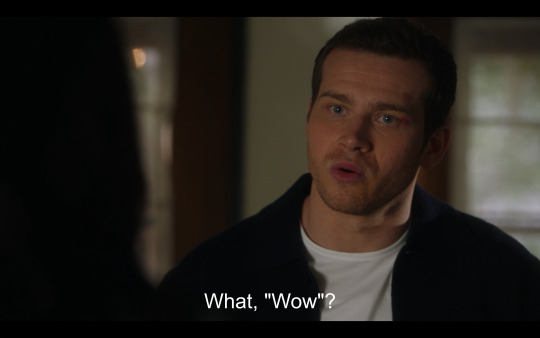
I just want to make an aside and say that I'm really happy they didn't go the route of having Maddie just "know" about Buck's queerness. As much as it's a funny headcanon, in real life "the glass closet" reaction from other people can feel invalidating, and Buck obviously reacts defensively when Maddie says "Wow", wanting to know immediately why she would say that. Also, just because Maddie is his big sister doesn't mean she automatically knows everything about Buck. I'm glad that both she and Eddie reacted with some surprise but mostly just acceptance.


I like that they're making it a point to show that even though it feels like Buck liking men is coming out of nowhere, it's really not. He's felt feelings for men and sexual attraction to men in the past, he just thought it was all normal. This also reminds me of his relationship with Eddie (and not just because Buck admitted to being an ass man and we all know who has the best ass on the show) because he views the relationship he was with Eddie to be "normal" best friends when it's really not true. There's a lot of nebulousness there but then in the scenes where it very much stands out that this is not typical male best friendship. But Buck just didn't realize it, and my guess is Eddie doesn't realize this either.
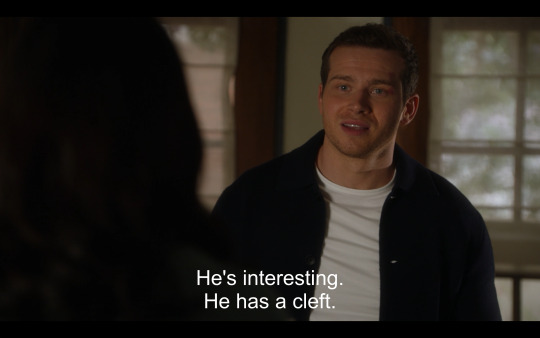
Very brief aside, but my roommate thought this line was interesting because apparently "clefts" in men are supposed to be generally perceived as "super manly" or known for being something The Manliest of Men have (think Clark Kent/Superman) and I just find it interesting that Buck's attracted to something that's very stereotypically masculine. Once again proving that he's attracted to the male form, not just personalities or such.
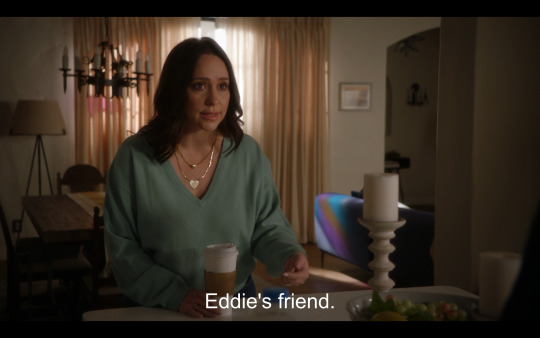
Qualifying Tommy as "Eddie's friend" here is fascinating because I really think Maddie was flashing back to the last episode when Buck was in her kitchen complaining about Tommy and Eddie, and Maddie had justified it as Buck being "friend jealous" only for Buck to turn around and date Tommy all of a sudden. I think a lot of things are slotting into place for her now, and I think a lot of her "wow" comment was also her thinking about the implications of this too.


Hence why this next line feels pointed. It's very straightforward, practically bashing us over the head at this point. Buck's not sure of his own feelings yet. I don't think this is meant to say he's unsure of being bisexual or attracted to men, but that's he unsure of what he's feeling in regards to who the object of his affection is at the moment.
"If there's something you need to tell Eddie, you will. In your own time."
Are you kidding me? Could you BE any more blatant? It's not "you'll come out to Eddie when you're ready." or "you'll tell Eddie about Tommy when you're ready". It's a purposely vague line because Buck doesn't know what his feelings are just yet, but those of us who have been paying attention know. What he has to tell Eddie goes far beyond just his newfound bisexuality. And once Buck figures out what his feelings are, that's when he'll tell Eddie that "something". And it's not gonna happen on anyone's timeline but Buck's. This line really leads me to believe that Buck is a strong contender to figure out his feelings by the end of the season and may end up being the first person to admit their feelings (possibly later on in season 8).
Trigger warning for Eddie/Marisol post-sex scene:

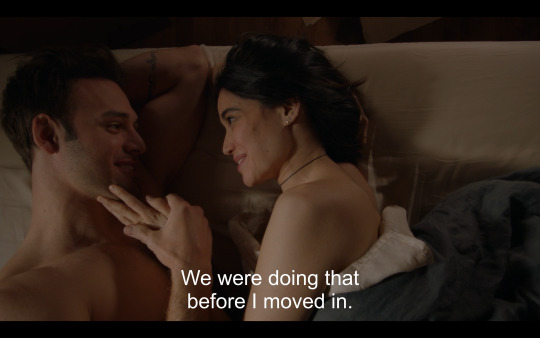
Firstly I want to draw several comparisons to Eddie's previous scenes with his love interests. The first is that this wide shot of the setting before panning to them in bed reminded me of the scene in 4x08 Breaking Point where Eddie is on his date with Ana and we hear grunting/moaning sounds, but it's a fake-out to them just sitting on the couch learning math. This time, it's not a fake-out, they really were having sex in this scene. The second parallel is the fact that Eddie and Marisol are lying together upside down on the bed. In my opinion, this is a blatant call-back to Shannon and their sex scene in 2x10 Merry Ex-Mas. Which to me signals a couple of things. 1.) That Eddie is very obviously trying to force Marisol to be a replacement for Shannon and 2.) He's doing the same thing with Marisol that he did with Shannon and using sex as a distancing method.
I know that sounds contradictory. Why would he ask her to move in if he's been trying to distance himself from her? Bear with me and I'll explain in a minute.
We know that Eddie doesn't know Marisol all that well, as proven by this episode. So what were they doing all of this time when they've been dating for months? Just not talking? Nope. Apparently, they've been having sex. So much sex apparently that they haven't been able to have any "get to know you" conversations.
With Shannon, the two of them had sex because it was easier than actually trying to talk to each other. Because when they would talk, it would always devolve into screaming fights. If Eddie is subconsciously trying to make his relationship with Marisol into the one like with Shannon, that may be an explanation as to why he's been so hesitant to actually get to know her at all. I'll come back to this more later.
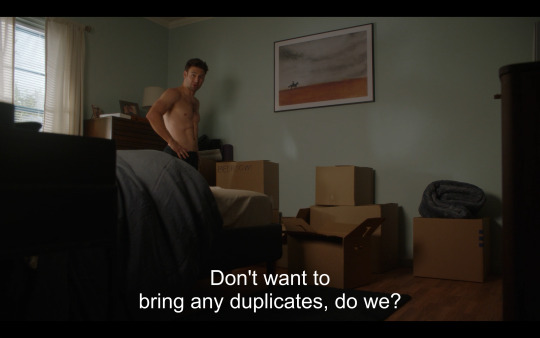

Now I'm curious if anyone else picked up on this line because it felt like a clear parallel to season 5, but not to Eddie's last relationship. Instead, it felt like a parallel to BuckTaylor shortly after she moved in 5x13 Fear-O-Phobia. Not only is BuckTaylor paralleled because Buck also asked Taylor to move in on a whim in order to save a failing relationship, but it's also where Taylor decided her couch (any couch theory truthers out there?) was better than Buck's couch and therefore he would have to get rid of his in order to make room for hers. To me, that showed Taylor's clear inability to make any compromises with Buck, and anywhere she lived would always be her place, and not theirs. This parallel is interesting because it just makes me think that it's foreshadowing more incompatibility for Eddie and Marisol in the future. With Marisol "invading Eddie's home", the more of her that is moved in, the more of himself he has to get rid of, shut down, or deny. That's not to say Marisol is on the same level as Taylor Kelly, oh no, but it might just show that this relationship Eddie has with Marisol might just be as unhealthy for him, as Buck's relationship with Taylor was for him.
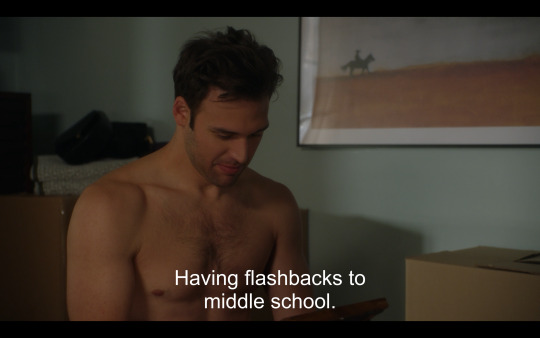

I also find it interesting how Eddie starts to make what he's learned sexual. He's not talking about your general "slapping of the hands or arms with a ruler", spanking very much has one definition, though it can be used in both PG and sexual situations. Spanking of a child's bottom is used as punishment, often to cause shame, in order for the child to not do certain things again. (This might be a controversial take but) spanking a child is physical abuse, and often has psychological repercussions on a child as they grow up. Eddie here seems to be insinuating that he was put through something similar when he was young. But then he also conflates it with the sexual form of spanking which should normally be fine between consenting partners. To me, I think Eddie is now subconsciously mentally connecting shame, punishment, and the conditioned urge to Never Do It Again or suffer the consequences with having sex with Marisol. The question then begs, what is Eddie so ashamed of and what are the consequences he's so afraid of?
I find it very curious that rather than Eddie being concerned that Marisol is too religious for him, or that they might have differing lifestyles that may not be compatible, he worries how this will affect their sex life. In my opinion, it's because on some level he's aware if he can no longer have sex with Marisol, what else are they supposed to do with the time they spend together? Do they have anything in common? Do they share any hobbies? It's especially interesting juxtaposing 7x04 where Eddie was having a BLAST going on dates outings with Tommy, and they had so much in common and Eddie was just asking Marisol to babysit multiple times a week. So with the little time he has been spending with Marisol recently, all they've been doing is fucking.
It's the same pattern of distancing he did with Shannon. She got pregnant, they got married, Eddie immediately enlisted and preceded to spend most of the following 4-6 years away from Shannon, only seeing her for short periods at a time where they spent most of the time they did see each other fighting. When he was back, Eddie was emotionally distant, which was a large part of the reason Shannon left in the first place. And when she came back, and he didn't have any other ways to distance himself? He used sex instead, and only really got it into his head that he wanted to get back with her when she had her pregnancy scare.
That's not to say there weren't good moments, or that Eddie didn't love her. But I do think a large part of the reason Eddie looks back on that time and romanticizes it is because he enjoyed the concept of being married to her and the safety net that provided him. Their marriage/feelings for each other were nuanced, but it can't be denied that from what we've seen on screen (which is all we can really call canon) it seems like a large part of their marriage was spent in (mutual) deep dysfunction.
So now that he doesn't have sex as a way to distance himself from Marisol what does he do? Avoids her physically as much as he can.

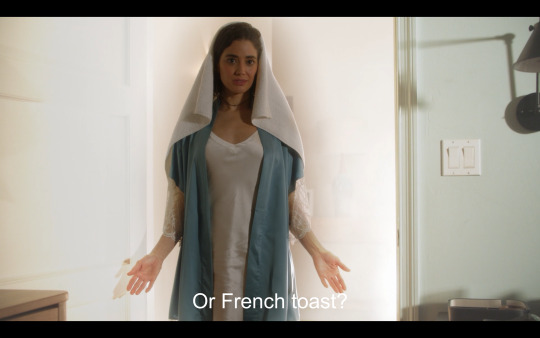
Additionally, I would like to touch on something known as the Madonna-Whore Complex:
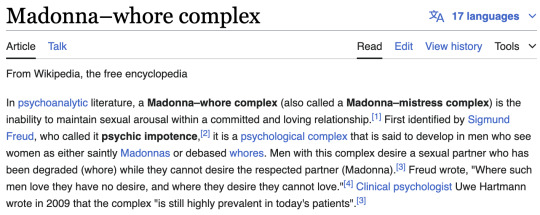
After we see Marisol in her nun attire, the next time Eddie sees her, he sees her as the Virgin Mary, mother of Christ, aka, the ultimate Mother Figure in catholicism. One could argue that Eddie's turned off because she reminds him of old teachers who apparently used to physically hit him and probably weren't very open to certain things that they would classify as "sin" or "ungodly".
Towards the end of their relationship, Eddie very much only saw Shannon as Christopher's mother, enough so that Shannon even questioned if he wanted her for her. Now he seems to be going through a similar problem, but instead of Marisol being the literal mother of his child, he's seeing her as this Mother figure and therefore unfuckable, hence his struggles to feel arousal about her after this. But as we're shown later as proven by Bobby, it does feel as if Eddie is using the whole Catholicism thing as an excuse to distance himself from Marisol.
So what's the truth of this? The Madonna-Whore complex is rooted in misogyny and patriarchy, but where do queer or repressed queer men fall into this category? That might be a little above my pay grade to answer, but it is still something interesting to think about.

This was very telling as well. "To avoid not having sex" essentially means he was purposefully avoiding having to talk with Marisol in order to turn her down for sex. Idk, but if you're in a good enough partnership where you're at the point of asking them to move in, it's usually assumed that you at least know how to communicate to your partner that you don't want sex. Why is Eddie afraid to tell Marisol that he doesn't want to have sex with her? It makes sense if ALL they've been doing most of the time they spend together is having sex. If he has to tell Marisol no to sex, what are they going to do then? Talk? Actually get to know each other? God forbid.
This starts the series of scenes in this episode where Eddie does everything in his power to avoid having a conversation with Marisol because now his sex-crutch is no longer there to distract the both of them.


I'll admit I didn't know what the "Manchurian catholic" and "sea monkeys" dialogue lines meant but I've since done some research and I get it now. "Manchurian Catholic" is a reference to the movie "Manchurian Candidate" which is basically about a man who has was brainwashed into being an assassin, highlighting the psychological effects of suppressed memories and trauma. Sea monkeys were a children's thing where you had like shriveled shrimp where if you add water, they blow up in size. Basically, there are three lines all pointing to the same thing: Eddie's sitting on a well of repressed feelings (that are attached to shame) that may have been conditioned "out" of him over time.
This is what is known as Catholic Guilt. The question then becomes: What does Eddie feel guilty for? What "sin" has Eddie committed that is making him feel so guilty? Having sexual relations with a woman who was an almost-nun? Having pre-marital relations? Could be on the surface.
The show is acknowledging that Eddie is far more repressed than he even realizes. I feel like these lines are inviting the audience to think deeper: what is Eddie repressing here? Is it really just that he doesn't want to have sex with Marisol because God is watching and judging him for pre-marital sex or sleeping with one of his exes (thank you Bobby for that amazing line)? Or is it something different?
Marisol never actually got far enough to be a full-blown nun. She made the choice not to continue with it, but Eddie still has a problem with it. The main part of the problem, in his own words, is that he can't get aroused when he looks at her anymore. Not only that but he's been unable to even masturbate because the thought of her turns him off that much. Like my dude, there's no rule that says you have to imagine your girlfriend while jacking off. A lot of people, even people in loving committed relationships, have sexual fantasies that don't necessarily involve their partner and it doesn't necessarily make them a horrible person. I think it's interesting that even in his sexual fantasies Eddie's so strict about being "loyal" to his partner, that he can't even allow himself to imagine anything else other than her when getting off. But now, he can't because the nun things turns him off that much.
I can't help but wonder, is it really the nun thing, Eddie? Or is it that Marisol's strong connection to catholicism reminds you of times when you were forced to push down parts of yourself that were only starting to blossom in order to conform to what your religion and your family expected of you. Is it that the nun thing turns you off so much that you can't get hard? Or is it because now that you've been reminded of how you suppressed your feelings growing up, the reservoir of feelings has bursted and you're being reminded that women....just don't do it for you in general. But to think about men is to invite shame, punishment, guilt, and pain, and to be avoided at all costs.
Maybe it's easier to pretend it's the nun thing and not a women thing.
On a slightly more humorous note:
Buck's "I wish I could help you with that" line is VERY interesting. Freudian slip, mayhaps? Do you wish you could help Eddie get off, Buck? DO YOU? ;)


Other than that, I also wanted to point out that this scene in the gym is a parallel to 5x02, when Buck and Eddie last sat in these exact spots and Buck did the exact same thing and gave Eddie good advice about how to handle his last girlfriend Ana, basically telling Eddie to stop stringing Ana along. I find it interesting we're getting callbacks to Eddie's last break up because last time he also decided he was just going to stick it out and it was only Buck giving him some perspective that allowed him to finally make the decision to break up with her in the following episode.
But this time, Buck isn't able to fully tell Eddie all that he wants to say, which is the truth about himself. He gives him advice to talk to Bobby. And Bobby's conversation with Eddie is the LOUDEST in the entire episode.
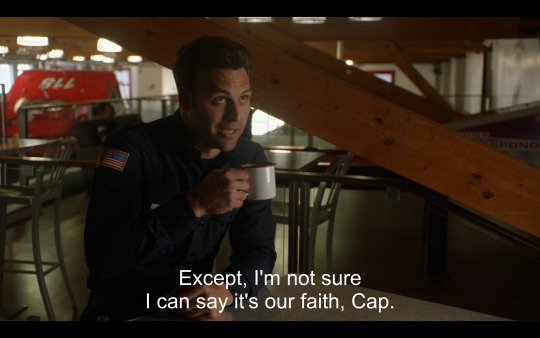

This scene is incredibly revealing because it shows that Eddie isn't even really sure if it is his feelings regarding Catholicism that are triggering this reaction in him. Bobby rightly points out that the effects of being raised Catholic don't just go away once you leave the faith. They can have lasting and lingering consequences, some that people might not even realize until later in life.

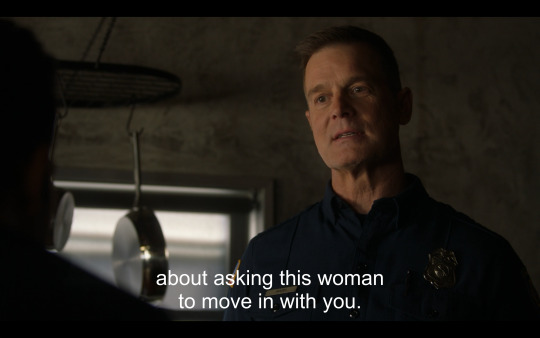
Bobby very blatantly tells Eddie that this adverse reaction he's having to Marisol's past as an almost-nun is likely a reaction similar to his panic attacks that he had about Ana when things were moving too fast with her back in season 5. Bobby says Eddie never talks about her, not in any way that makes it seem like he was so serious about her as to ask her to move in. This comes out of nowhere for Bobby (and the rest of the characters) just as it does for the audience. This is to show us that what Eddie is doing IS out of nowhere and is a decision that should be questioned not just by the audience but by Eddie as well.
The fact that Bobby is comparing this reaction to how he acted with Ana really does harken back to the "repression" storyline of season 5. Eddie's subconscious is trying to tell him something, but he's ignoring it (as he always does) and is instead doing the exact opposite of what he should do and doubles down on Marisol.

And Eddie, as always, gets the exact opposite message of what Bobby's trying to tell him. Because Eddie's not a commitment-phobe. He commits too much, too fast, almost as if he cares more about getting to the "committed" part of the relationship, and doesn't care enough to actually build an actual bond with the women he's with. And Bobby gets to the heart of it by name-dropping Shannon. Because the crux of his commitment issues started with her. When he felt so guilty for getting her pregnant and then later for abandoning her for the military, that he basically vowed to stay committed to her for the rest of time, in life and in death. She's been dead for five years at this point, and Eddie is still hung up on his guilt over her. And no, I will not say he's hung up on her or his romantic love for her because that's not true as proven by his next line.


All I have to say is THANK GOD. Thank GOD the show is finally acknowledging that Shannon and Eddie did not get married because they really wanted to, or because they just loved each other so much. They got married because they got pregnant and were pressured into getting married by their catholic community and families. The show is finally starting to deconstruct Eddie's marriage and his romanticizing it over the years.
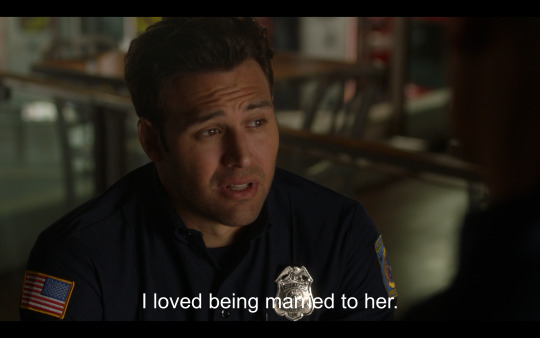
This line blew me away. Because he doesn't say "I loved her" or "I loved being with her." He loved being married. He liked being committed. He liked the knowledge that he had what was expected of him, a wife and a child. He liked being settled, knowing that he wouldn't ever have to go back out and make himself vulnerable to find another partner. He would never have to crack himself open so far to be truly known and get hurt. They could both hurt each other so deeply and it wouldn't matter because Eddie at least did his duty. He married her, made an honest woman out of her in the eyes of the church and their families, and provided monetarily for her. But he never gave her him, not fully, and that comes straight out of the mouth of Shannon Diaz herself.
What Eddie is seeking from Marisol is not a partnership, it's not a genuine connection with an individual. Because to create those kinds of relationships requires exposing yourself and letting in the possibility of being judged, of being hurt, of losing them. And Eddie doesn't want to be so invested in a person like that ever again. He already experienced that kind of loss with Shannon, and even they didn't have that kind of deep soul connection. I wonder if Eddie's afraid that he wouldn't survive that kind of loss if it was actually a partner he really deeply and unconditionally loved. It might destroy him, and that scares him.
So instead, Eddie would rather just skip forward to committed, to moved in, to married, to settled, and just stick it out when he has panic attacks, when he feels like he's sleeping next to a stranger, when sex is as deep of a connection he can ever get with a woman.
But when his body fights back, in various ways, in panic attacks, in sexual dysfunction, he doesn't listen to it. He ignores the signs.
Go to part 3!
Part 1, Part 3, Part 4
52 notes
·
View notes
Note
Hi, please free to ignore( huge fan of your metas btw)
What are your thoughts on Peter pettigrew? In swm we saw him fanboying over james to being responsible for his death. Just because he was afraid or he never really loved his friends. Many people say James and Sirius treated him shitty thats why he betrayed. Some even say he was just a tag along. Please share your thoughts.
First of all, thank you!
(also, unless they are rude, I don't ignore any questions, it might just take me two years to answer)
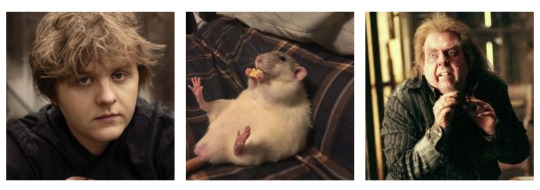
Peter Pettigrew
My very controversial opinion on Peter is that I love him (as a character).
To me, Peter is one of those characters who represent how Rowling's clear lack of self-awareness as a person translates in her work into her being unable to recognize her strengths as a writer. The majority of the most interesting things she comes up with are not the ones she focuses on.
And that's the case for Peter Pettigrew, who might be the Marauder with the most interesting story.
It's way too easy to reduce him to a coward as the author seems to want you to believe. And even claiming he didn't love his friends is a flattening of his character.
You can have a tendency to be influenced by peer pressure all you want but you don't become an unregistered animagus to help someone if you don't love the friend you are doing that for and you don't have a bit of courage (especially considering how long the whole thing was and that he wasn't particularly talented). He risked extremely severe consequences on his body due to the possibility of the process going wrong and he risked Azkaban for being unregistered.
That's fundamentally the opposite behavior of the one he later has with the Potters.
I also think it's important to point out how Remus is not a close relative (father, son, brother) and how the help Peter provides is not essential to Remus' survival, it's emotional comfort. The lack of necessity of the animagus matter and the easily cancellable bond with Remus increase the braveness and love of Peter's act (in contrast for example with something like what Narcissa does with her son by lying to Voldemort).
I think Peter's story is the one of someone who lost his courage, not the one of a person who never had it.
Doesn't this also make it so much more delicious how his downfall is caused by the return of a glimpse of honor?
I do agree with the fact that in SWM, James and Sirius don't treat him particularly well, especially Sirius, but I don't think they are that aware of it, especially James. They are a bit crude, and they are arrogant. They are two bright posh 16yo guys in a boarding school in the 70s. I don't expect from them a particularly high level of sensitivity in how they talk to people, especially to someone they take for granted knows to be their friend. Sirius is probably more aware of it, but I believe James to be quite unaware of himself at this point in the timeline. This is before his maturation really kicks in, his whole interaction with Lily shows a lack of self-awareness in how he talks to people (we know Lily turns him into a bit of an idiot, the problem is that he doesn't seem to be aware of it). Sirius on the other hand seems a lot more self-aware than James. A lot of people are not going to like what I'm about to say but: James is canonically a better person than Sirius.
And yet, it is abundantly clear that both James and Sirius love Peter.
James gives into Peter's hands his own life and the ones of his wife and son. Sirius gives in Peter's hands the lives of the family he chose.
In the Shrieking Shack, under all the pain Sirius has for the death of James and Lily, it is evident that there's also the pain that comes from the betrayal of a friend.
"THEN YOU SHOULD HAVE DIED!" roared Black. "DIED RATHER THAN BETRAY YOUR FRIENDS, AS WE WOULD HAVE DONE FOR YOU!"
- Chapter 19, Harry Potter and The Prisoner of Azkaban
Lily herself is very attached to Peter, in her letter to Sirius, she calls him Wormy (how cute is that?). And, let's remember that she too puts her life and the ones of her husband and son in Peter's hands.
It's too easy to say Peter was just a tagalong, that they didn't love him. It incredibly diminishes the pain of his act.
I also would like to point out that Peter isn't stupid. He was a double agent, he managed to frame Sirius by using in his favor people’s low opinion of his skills (and Remus and Sirius' rocky relationship). James, Sirius, and Remus might have thought of themselves as smarter than Peter but I don't think they actually believed him to be stupid. Considering who the Marauders are, their knowing how good of a liar, and how cunning Peter could be, would be a perfect explanation of why they became friends in the first place.
Does this mean they all loved Peter but Peter only loved Remus out of his friends?
We can't really be sure of his feelings for Sirius, but the admiration he shows for James and the sense of guilt we know he has for his double agent activities don't really align with that image.
I think Peter's fear for his own life ended up winning over the love for his friends.
But why at this point? Why not at Hogwarts?
Something quite interesting is how Peter's father is the only parent of the Marauders who is never mentioned, not in the books, not in any additional material. Doesn't that align just so well with Peter always putting himself at the service of the most important male figure around? First James, and then after school, with the war going on, Voldemort.
Isn't it such a fitting image, Peter growing up without a father, with a too-cuddling mother whom he ends up resenting, faulting her for the absence of the father? It's so natural to paint him as a young man crushed by a sense of inadequacy towards an image of masculinity he idealizes but can't fulfill, supported by a society filled with a very toxic sense of masculinity and an absent father he can sew on any fantasy he wants.
When Peter was at Hogwarts, being friends with James, and being part of the Marauders, gave Peter a sense of security that allowed him to be brave enough to prioritize his love for his friends over himself.
Out in the real world, though, Voldemort is the dominant man and being positioned against the Dark Lord takes away the sense of security he had as a student. Both times Peter goes to Voldemort, he does it because he doesn't feel safe.
It's also abundantly clear how Peter's siding with Voldemort doesn't come from ideology. He becomes an animagus for Remus, he's a dear friend of Lily.
Peter dies because Voldemort doesn't trust him, and he is right in not trusting him. Somewhere in Peter, there's still the boy who risked his life for a friend.

Try to tell me this is not an interesting character.
He's still a coward overall, but a complex one.
Also, Peter Pettigrew is a clear victim of pretty privilege when it comes to the fandom. I'm ready to bet whatever you want that if he had been described as handsome the most popular ship with Sirius would be Sirus/Peter.
Actually, he didn't even have to be described as handsome, he just needed to not be described as ugly. Draco is described as having a pointy face and people have been lying to themselves claiming he's incredibly handsome for the last twenty-five years.
77 notes
·
View notes
Text
Coming Up/Starting Over
Thinking about the dialogue between Paul and John in McCartney II and Double Fantasy: 'Coming Up' is a song addressed to a friend who wants "a love to last forever" (a reference to Don't Let Me Down) as well as "peace and understanding" (Give Peace a Chance, etc.), in which the speaker is offering reassurance: I am that friend, I want to help, hang in there and things will get better. "Never fade away" could be construed as a Buddy Holly reference (to "Not Fade Away"), and while 'searching' is a common verb, it's also the name of the song Paul always refers to when talking about the Cavern days. There might be other references I'm missing, but it's very much a song about music, which is underlined by the video, in which Paul plays different musicians (including himself as a Beatle), as well as by the extra lyrics in the live version ("I know if we could get together, we'd make music endlessly"), and the fact that Paul talks about 'coming up' as a radio reference ("coming up on the hour" - also in the live version).
Put that together, and I think it's both a friendly message to John - hi, I'm still your friend - and an invitation to make music together again. If you see it as a more romantic relationship, then obviously there could be other subtext there, but the basic idea is the same either way. (Invoking "Don't Let Me Down" to say "actually, ours is the love that lasts forever" ten years later can be seen as both bitchy and wildly romantic in a way I find kind of charming.)
This isn't a new idea, but it's interesting to think about John's songs as a response to that. First, there's "I Don't Wanna Face It", which the Beatles Bible says he started in 1977, but which clearly had a pretty overt musical reference to Coming Up incorporated into it when he reworked it in the summer of 1980. It was apparently the first song he recorded for Double Fantasy, and no matter which way you read it, if Coming Up is a question, I Don't Wanna Face it answers it with either "no" or "no, and fuck you".
But that isn't actually where the conversation ends, because John decided not to put that song on the album. Instead, one of the last songs he wrote for Double Fantasy was "(Just Like) Starting Over". I don't discount the idea that the song reflects his feelings for Yoko, or that he wrote it to better fit the narrative of the album, but I'm always a fan of the idea that a song or a work of art can say more than one thing at a time. I do not think that John, in the late 70s or 1980, would accidentally reference Paul's band and two of his singles in his lyrics without realizing it ("it's time to spread our wings and fly, don't let another day go by, my love"). Also, just as Coming Up is a meta song, so is Starting Over: I see your Buddy Holly, and I raise you an Elvis. And where I Don't Wanna Face It is a 'no', Starting Over feels like a 'yes' - the whole song is him asserting that he doesn't want to give up on a relationship. And maybe the yes has nothing to do with romantic love and everything to do with music - that would certainly make sense, both in relation to the songs themselves and to where John and Paul were musically and personally (both making albums that were, on some level, about recapturing their love of music, and allegedly considering working together on Ringo's album). Or maybe they were having wild sex in motels all over Long Island, idk. But the existence of the dialogue itself interests me, and it's nice to think of it ending on a positive note given what came next.
53 notes
·
View notes
Text
RWRB costume/ colour meta!
Ok, lets do this!!
Man have I missed writing costume/colour meta, so its good to have something to write about again! This took me far far longer than it should have - I kept getting distracted by the film while I was working on this - I'd go looking for a clip or to grab a still and end up just watching the film again 😂😂😂 but I've finished it and I hope you all enjoy it! Grab a beverage of your choice because this thing is a beast coming in at over 7000 words - I totally understand if you want to skip, but I have ADHD and do not know how to be concise 😂😂😂
Red white and royal blue employs several fun and interesting costume and colour theories (also made use of in the set design) to help tell the story of Alex and Henry. I’m not going to write a detailed meta for each costume - I just don’t have the time - but I am going to look at some costume/ colour details in focus, especially for Henry and Alex as well as highlighting other interesting choices! I also do not have the picture limit (I need more than 30!!!) to include every image I would like to, so if you want to see what I'm talking about, you might have to go check out the relevant scenes (I'll try to give you timestamps where I can!) I’ve kind of tried to do things chronologically, but I’ve left Alex and Henry to the end so if I don’t talk about them very much in the rest of this meta - that is why! putting it under a cut because its so long!
The royal Wedding
There are a couple of key themes here, the wedding party (consisting Lady Martha, Bea and Henry) have a distinct colour palette - dusty blue, dusty pink and Ivory, with the exception of Prince Phillip who is in his red Dress uniform - they’ve used a red uniform to make him stand out, convey that he is more important than the bride (what with his being in line for the throne and all that jazz) and hint at power - red is a power colour.
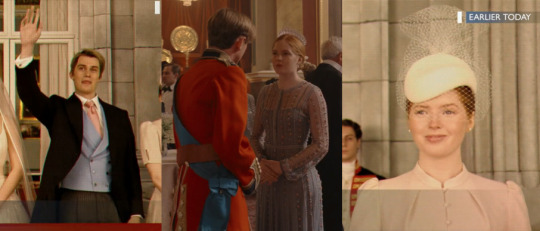
I’m not sure what royal orders the collar and riband that Henry is wearing are supposed to represent as they don’t belong to a specific British order - if I had to take a punt I’d say his red collar is meant to be a AU version of a Knight Grand Cross of the order of the bath but the one he’s wearing certainly isn’t a real order in the UK (it isn’t meant to be an order of the garter as that is the highest ranking order and Henry would then also be wearing the light blue riband we see on Prince Phillip) the royal blue riband with the red edging is more i line with the night grand cross of the order of Victoria, although in real life that riband should be for in the opposite direction. My feeling is that they wanted a red collar on Henry to play into the red as a symbol of power theme they’ve used on Prince Phillip, placing Henry as having the ‘power’ in his conversation with Alex (as he is on home turf) and the royal blue sash is a deliberate choice that I will talk about later when I focus in on Henry and I think its actually pretty significant as a choice. essentially the order insignia he is wearing are not real orders which is totally fine as this is essentially and au royal family!
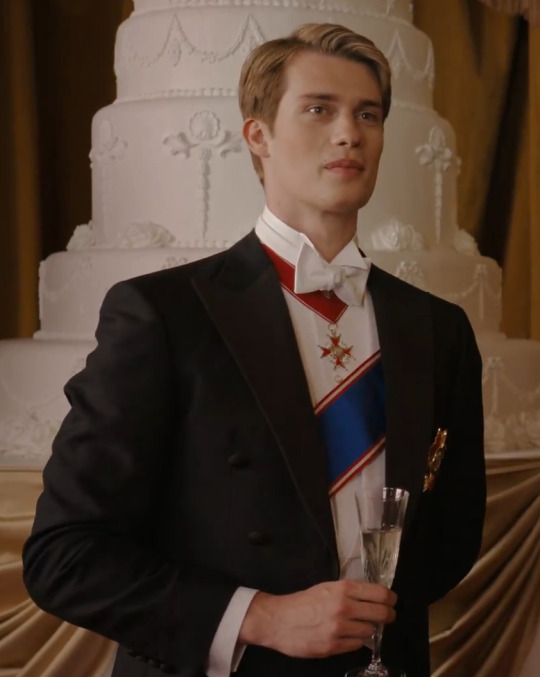
We do have to talk about that wedding gown - not royal in the slightest - spaghetti straps and a low back would never be allowed for a royal bride, the dress is also too long on her (but that’s a different conversation about budgets and rental gowns so we’ll let it slide here!!) and her hair should also be fully up - not in the half up do she has going on! The colour is also wrong - she would have been tied to a very limited colour palette of white or ivory - no colour in a royal wedding gown, so the blush colour we see is a no go! I totally get why they did what they did with her gown in terms of colour and I’m fine with that choice (i’ll explain more in the next paragraph), I even get the fairytale princess look they were going for with that dress - but when you’re trying to portray a family so stuck in tradition and history etc, I can’t help but feel that they missed a trick to show her as buttoned up, conforming to the crown etc, especially as we never see her again!
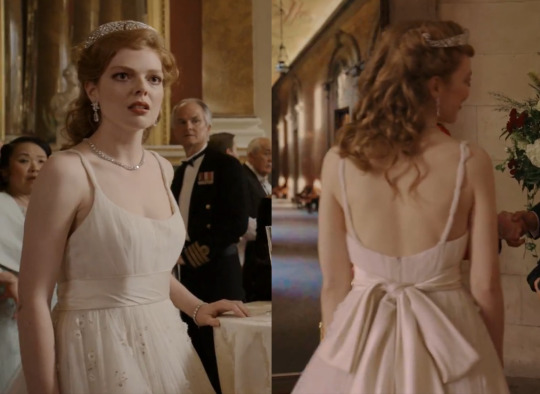
At the reception we see pretty much everyone in colour of some description, with the exception on Alex and Nora who are both in black - this is why Lady Martha’s wedding dress is a pale blush pink colour rather than white. The only reason that the men aren’t in colour (if they’re not in dress uniform) is because they are wearing white tie for the formality of a royal wedding, otherwise I think we would’ve seen coloured ties or some such on them. This is intentional because the room has a general (muted) wash of colour which serves to highlight Alex and Nora, making them stand out and look like they don’t really belong.
Its a way of creating a them and us vibe and helps to establish the rivalry between Alex and Henry - we have a British scene, full of colourful clothing and the only identified foreigners are in black and white. We actually only see a black and white colour palette for the clothing of the Americans until Alex returns from his PR fix it trip to London after cakegate, while nearly all the Brits all were colour of some description - we can see this clearly in the hospital - all the children in colour, Henry in blues and - Henrys security in coloured ties while Amy is there totally in black.
Alex himself does wear navy blue but its a dark navy and that jacket is actually two tone - black and navy and its paired with black trousers in this scene - we see it again later - paired with taupe trousers which really helps to establish this idea of colour entering Alex's world once Henry is in it.
Sets
I’m going to pause on clothing here to quickly talk about the sets in the film and their colour palettes because they fall into three distinct categories;
We have the sage dusty greens, gold and bright reds of the British spaces - they have a regency and victorian air to them, all very traditional, opulent and royal in feel - they are the definition of a gilded cage and are ostentatious and Henry’s bedroom even fits into this mould (its very telling that we only see very limited physical intimacy between the two of them in this space - because its a space that neither of them truly fit or belong in) with its sagely green walls that echo the green walls of the state room the big royal family showdown occurs in.
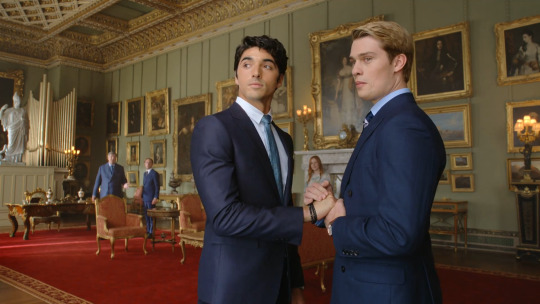
Then we have the creams, taupes and beiges (with a bit of minty green for the walls of oval office) of the America spaces combined with the very intentional colour choice of that rusty orange (there is also the red room but that is a whole other conversation - I’ll go into it later).
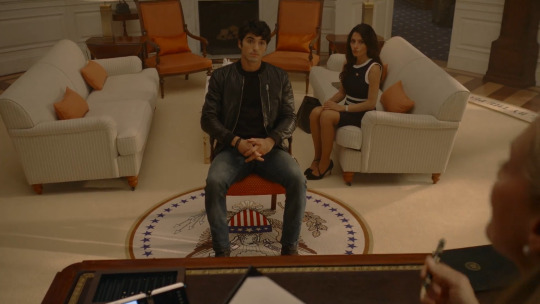
The Rusty orange is such a colour choice, its rich and eye-catching. All colours have meanings associated with them - these can vary wildly depending on where and how they are used and have both positive and negative connotations.
Generally speaking, orange is an attention grabber - its energetic and stimulating, but it also conveys transformation and endurance. This orange has brown undertones which means we should also reference brown colour meanings when thinking about what the colour means on screen - brown is a safe colour and it is also strong and reliable, but it can also portray a sense of loneliness - that is something I think is a really interesting concept - we see Henry in Alex’s world (through the text chats as well as in the first blowjob scene) on the rusty orange sofas and one of the underlying major parts of who Henry is, he is enduring like the orange (and his royal status make him an attention grabber without needing to try) but there is that underlying sense of loneliness - yes he might’ve had a crush on Alex since the climate conference, but as soon as the air had been cleared between them during the PR trip Henry reached out and pursued Alex because he was lonely and wanted a friend - not knowing if it could ever be more than a friendship.
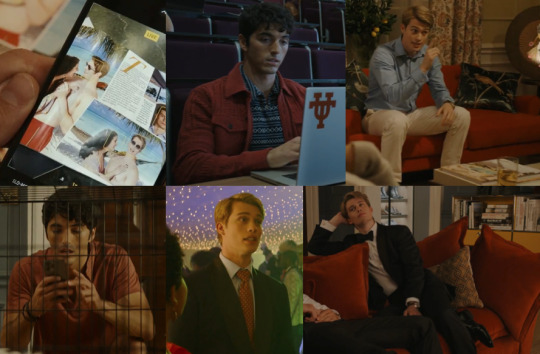
Then, finally we have the spaces Henry and Alex occupy - spaces which are just theirs to occupy - spaces when they are themselves - these are predominately yellow and blue spaces, with some deep colours such as the teal we see on the walls of Alex’s room and the red room.
I’ll go into more detail about all the yellow and blue in this film a bit later on in this meta, but to provide a comment on the red room - red is a colour of passion and love, but this shade of red they’ve chosen maintains that orange undertone we see in the rest of the American spaces.
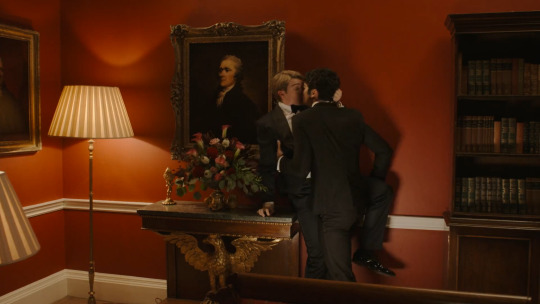
I wrote a post on the choice of red calla lilies and how they are both a symbol of love and commitment, as well as a phallic symbol of sexuality, and I know Alexander Hamilton was on the wall in the book, but he is there not only because he was very likely bi, but also because he was the subject of what is known as the first political sex scandal - something our boys are essentially also themselves going to end up becoming!
Once Alex does return stateside we start to see colour begin to fill his world. This is a really interesting thematic choice - think how the wizard of Oz (a film very much associated with gay culture - ‘a friend of Dorothy’ was a slang code used by gay men to identify one another and there is obviously the rainbow connotation) begins in black and white and then transitions to colour as soon as Dorothy wakes up in Oz. This film is playing on that same trope/ concept - this is a story essentially told from Alex’s perspective, so Henry and his world is already in colour - its only when Alex enters that world and becomes entwined with it that colour starts to seep into his life - its done in a much more subtle way, but it is there - even during the text bantering they have going one while he is watching a film with Nora - it is a black and white film (‘Some Like it Hot’ - its self a film that helped open conversations about queer identity and the queer community at a time when the Hays code was still in operation and when Sodomy laws still existed in the US, but that is a whole other conversation and lots has been written about it before, its one of my favourite films and if you want to know more then head to your search engine of choice or hit up my inbox! It’s also a film our director Matthew Lopez adapted for the stage which is possibly partly why it was chosen for this scene- as a nod to his other work!)and they are both wearing grey while Henry is in colour (cream and blue - playing into the queer coded yellow blue theming) and sits on the bright orange sofa.
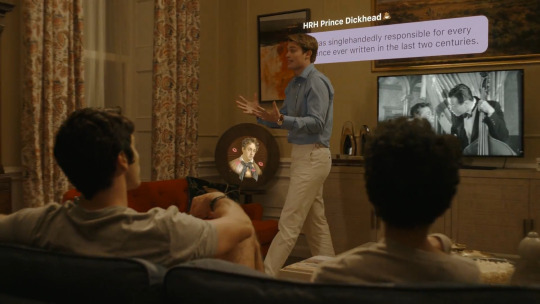
I cannot tell you how much I am in love with the Koi carp on Alex’s dressing room wall because the symbolism - the symbolism!!!!! Koi are seen as a symbol of strength, patience, perseverance, love and bravery they symbolise success through courage. Koi are known to swim against the current and overcome great obstacles - there is a Japanese proverb ‘Koi no Takinobori’ which translates as 'koi swim up waterfalls' and as the word Koi in Japanese also translates to mean love the proverb therefore means that love can go against the current and overcome great obstacles and if that isn’t the perfect metaphor for Alex and Henry’s relationship then I don’t know what is!!
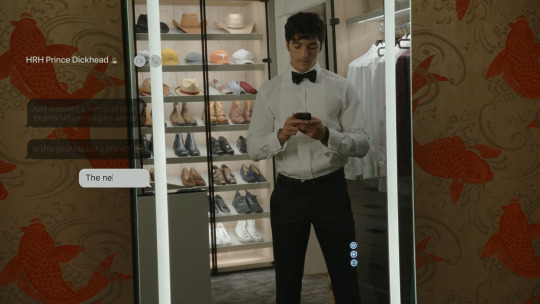
I am obsessed and I adore the set designer for including that wallpaper in general, but especially in their text banter flirty developing relationship - the writing is essentially on the wall for where their relationship is going and how its going to unfold - they are literally Koi swimming agains the current and overcoming great obstacles to be together!!
Back to the costuming!
As I said previously - when Alex returns from the PR trip we start to see increasing amounts of colour and it starts with blue - Oscar is wearing a blue shirt - a colour we only see him in for that scene and then again at the end of the film - during election night. Its an important choice - Henry's colour is blue - its the colour we nearly always see him in some form of blue so for this to essentially be the first colour that appears in the clothing in Alex's world is telling in its own way - it is the beginning of the slow saturation of Henry in the world of Alex. Oscar is always in tan colour-ways apart from those two scenes and generally speaking we see him wearing Mexican tribal and geometric prints/patterns and cowboy boots - playing into his Mexican heritage, but also establishing him as Texan.
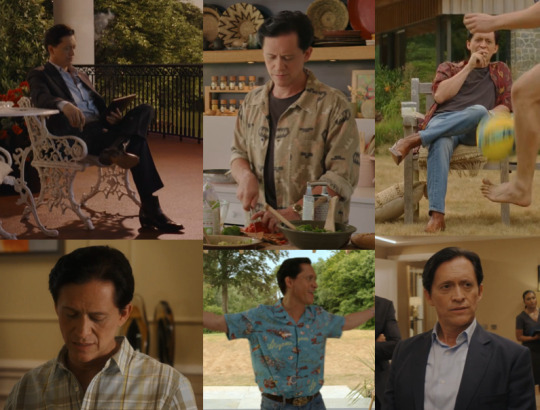
Miguel is clearly set out as the baddie to us all - head to toe in black all the time expect at the PM dinner - when he has to wear a white shirt because its etiquette - but they do make sure to give him black buttons on that shirt - which separates him from everyone else in dinner dress very clearly and keeps the undertone of untrustworthiness going.
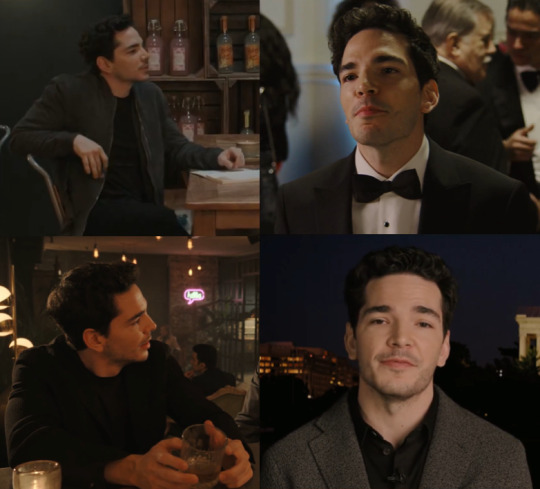
The other thing to note is the grey fuzzy jacket he wears when being interviewed on the news. I’ve spoken before in my 911 meta’s about how the use of the grey fuzzy patterning is symbolic of confusion or obfuscation and that holds true here - Miguel is called out as being the one who hacked and leaked the emails by the presenter and he tries to bluff his way out - to obfuscate the truth.
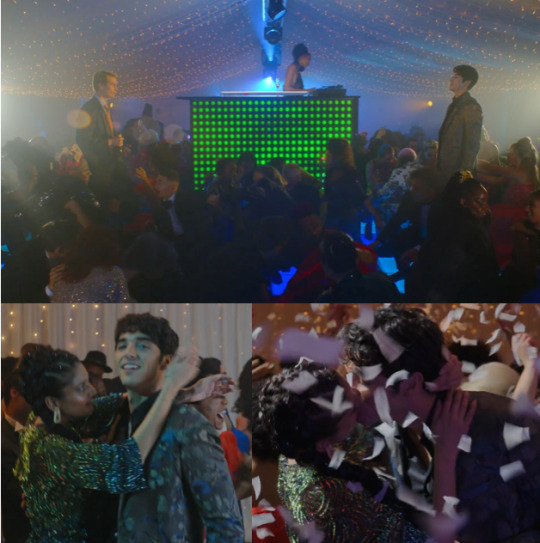
We see the idea of green and jealousy play out a couple of times in the film - the flirty girl that tries to commandeer Alex and kisses him at the NYE party is wearing a very blatantly iridescent green dress which sets her apart from the rest of the crowd and then when the crowd drops low we also get the green lights on the DJ desk - while the scene is a play on the I saw you across a crowded room idea, there is also that undercurrent of jealousy - Henry is Jealous of Alex’s ease and that he cannot have him loudly and in the way he wants - highlighting that jealousy helps to build into Henrys later actions when he throws caution to the wind and kisses him under the tree.
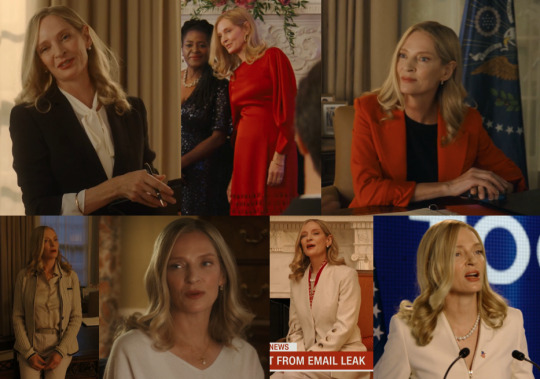
Ellen Claremont has a narrow colour palette as well - we only see her in black in that first scene and in the ‘new Texas strategy’ arguement with Alex, after that her dominant colour is cream and we also see plenty of red which is a power choice - she wears it in scenes when she needs to convey power and status such as at the PM dinner or when she is shutting down his Texas strategy. The cream is the base colour for her - its a colour of elegance, sophistication, it is also a neutral colour - playing into her position as POTUS, but also when she wears it in one on one scenes with Alex, it is a sign of her being a mother rather than the POTUS.
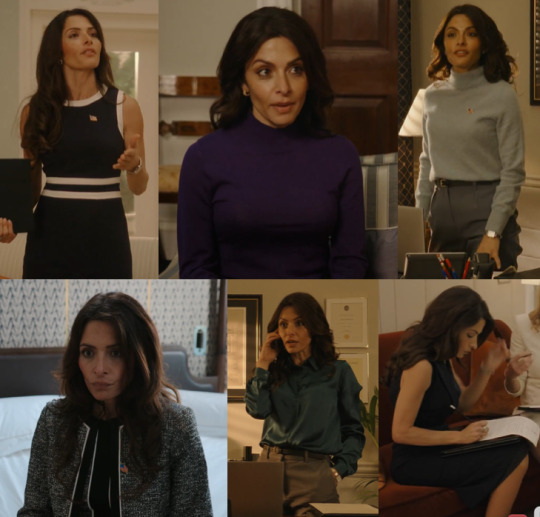
Zahra tends to wear blacks with one blue/grey cashmere jumper and when we do get colour on her they are jewel tones - purple and teal. We also get some more grey fuzzy patterning - again playing into my previous statements - here it is very much about confusion rather than obfuscation - she only wears the fuzzy grey when she finds out about Alex and Henry and has her mind blown by the knowledge. Its a perfect costuming choice for this scene as it conveys so much about where her brain is - that her mind has been blown by this huge thing she as just become privy to and it helps make her facial expressions even louder!
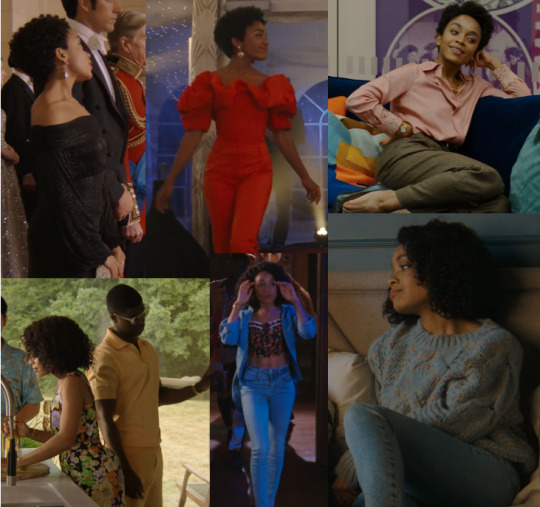
Nora wears a full spectrum of colours, the stand ones are obviously the red bodice and trousers she wears for new years and the pink shirt she wears in the office when Alex is having a mini bi panic and figuring himself and his attraction to Henry out. Generally speaking a characters costumes are meant to be about them and their own character, however with a film like this, everything is a driving point for the two main characters and so, other characters costumes will, at key points be less about the character wearing them and more about driving the story of the mains forward - this is very much the case with Nora’s red outfit (and we have already talked about the green of the flirty girl at new years representing jealousy).The red is very very red, it is meant to stand out and is a nod to romance - for both herself with Pez and for Alex and Henry, but Red is also a colour associated with passion and sexuality as well as fire and heat - essentially it is a marker that things are about to kick into action on the romance scale - we are heading from friends to lovers.
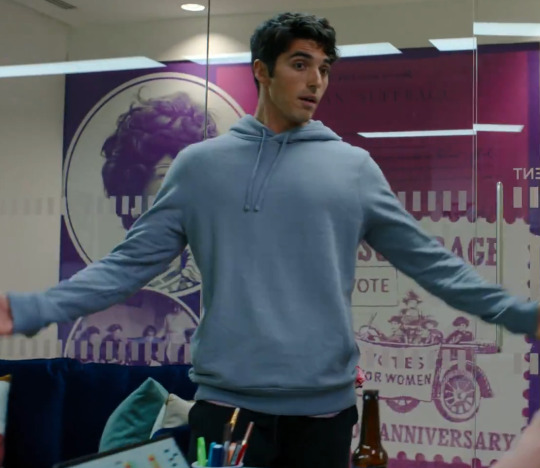
The pink shirt plays into the same theme - its a continuation, but a cooling down - less about the heat and passion of a sexual encounter, and more about the concept of romance and relationships - because that is what the conversation is ultimately about in this scene. We have the bi flag background helping to visually tell us what the conversation is about, but we also need to have that subtle reminder that this is not about fire and passion it is about the potential for romance - for love - because if Alex is going to hook up with Henry, it isn’t going to be a hook up, it going to be real. We do of course see things heat back up in the red room (as they should), but ultimately that is the last of the fiery heat we see - from then on anything connected with Alex and Henrys relationship is much more steadfast - the blues and yellows I will talk about in a minute!
Lets talk signet rings!! We see them worn on the male members of the royal family - so King James, Phillip and Henry - as well as Alex when Henry gives him his ring. their use is telling and significant. James and Phillip both wear their signet ring on the little finger of the right hand, while Henry (and Alex) wears his on the little finger of the left hand. in a general sense one would usually wear a signet ring on the little ringer of the non dominant hand - so if you’re a lefty you wear it on the right hand and vice versa if your right handed. This is not what is being portrayed here - all three of them are naturally right handed (yes I did spend far too much time on google to find this out!!) which would in theory mean all of them should have their rings on the left little finger and yet only Henry does.
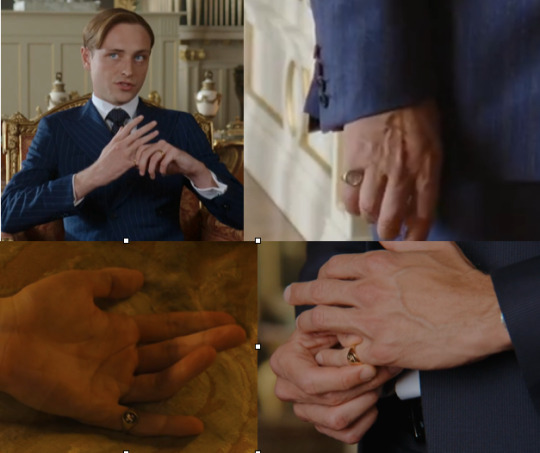
There is however another explanation - a ring worn on the right hand is symbolic of tradition conformity and rigidity and royalty (traditionally the monarch would wear a ring on the right hand and this was offered to subjects to kiss), wearing it on the dominant hand as a sign of power/ dominance. Henry and then Alex wear Henry’s ring on the left hand - the traditional hand that wedding bands are worn - because of the concept of the main artery running from the heart down the left arm and into the left hand, it is a symbol of love and life and connection to another person and is where the concept of the red string of fate comes from (which ties in nicely with Alex referring to the rope in his chest pulling him towards Henry). This all gains greater significance when Henry gives his ring to Alex and that he choses to also wear it on the left hand, its essentially a symbol of engagement and eternity - it is a sort of pre engagement I guess - and is a low key statement from Henry he is giving Henry Fox to someone for eternity - to Alex.
Right, shall we talk about the yellow and blue theming that I keep mentioning. This specific theming, tends to be seen more in sets and lighting than costumes - although we do see it used in costuming too (looking at you Bea!!). For those not aware, there is a tendency to use yellow and blue colour-ways for queer story arcs - if you look at Heartstopper (esp s1) they have been using it to great effect , and it can be seen in other shows and films with queer character arcs to such as 911 (and Lonestar), as well as plenty of other mainstream media if you’re looking for it. I don’t know when or how it became a colour way associated with queer relationships - especially mlm relationships - I’ve not had the time to deep dive into that particular research spiral - but suffice to say we see it put to very very great effect here in Red White and Royal Blue - we only ever see it used as a colour way when it is regarding Alex and Henry and their romantic relationshipI’ve included some of the blue and yellow we see (couldn’t fit it all in - 30 pictures is apparently not enough!!!) surrounding Alex and Henry and there is plenty of it. The first time we see this yellow/blue theming come into play is at the turning point - when Henry opens up the lines of communication with his text message. Alex is in his room - the first time we’re seeing into his room - a room painted dark blue and full of yellow accents - the lamp on his desk and the unit to the side of the sofa, as well as the very yellow and blue painting we see above his bed (which was commissioned for the film and so the colour choice was very much deliberate). Just to show how prolific the yellow/blue colour way is here is a list of most of the occurrences - I've tried to include as many of them in the pictures as I can as well.
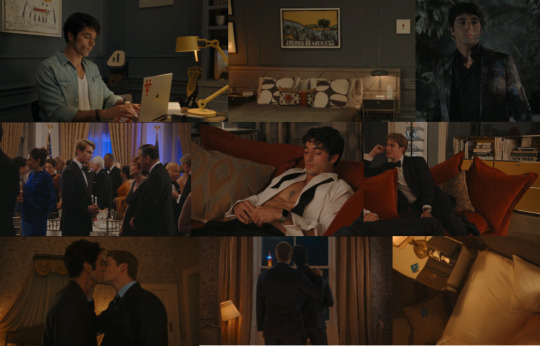
The copy of People is yellow and blue, the Jacket Alex wears for new year has gold and blue embroidery. The PM’s dinner has blue lighting with gold curtains and there are a lot of blue and yellow dresses being worn in the crowd when Alex is watching Henry. The cushion on the sofa behind Alex is yellow and blue. Then we get to the French hotel room and the Eiffel Tower - it is literally all yellow and blue - everything - even down to the blue (extra safe) condom packets. the New York hotel room is dark blue and gold another is a blue bottle of lube on the side (the condoms and lube are very much a deliberate colour choice - there are a million different colours you can buy both in so if the colour wasn’t important they could’ve chosen any, esp as fuchsia and red is the most common colour for both in the durex brand in the UK).
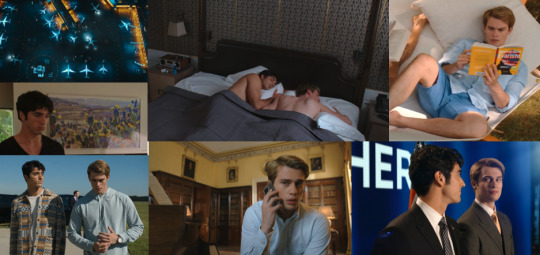
In England - Henry mostly occupies green spaces - in keeping with the royal theme I wrote about earlier - however the room he is most himself and most comfortable in is the music room/ library which is yellow and any time we see him in that space, he is wearing blue. It is telling that when the emails between Henry and Alex are hacked, his sanctuary is full of ‘old white men in suits’ and Henry cannot go in there - symbolic that who he is - his true self - has been violated and he is being forced into ‘royal coded’ spaces - back into his box as it were!
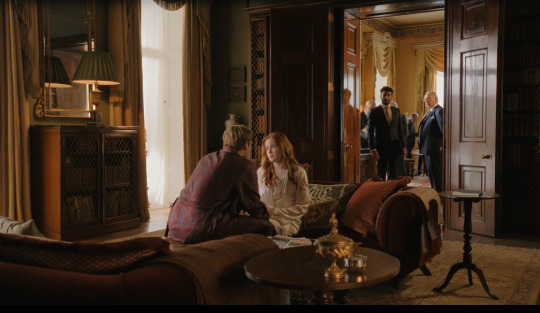
Back to costumes and he two blue hoodies. I’m gonna get a bit of hate for this, but the blue hoodie is actually two different hoodies! - they are slightly different shades of pale blue - Alex’s is much more dusty blue, while Henry’s is much more baby blue, they are also different cuts - Alex’s a traditional sleeve cut while Henry’s has a raglan sleeve cut (think baseball tee). There is the idea with these two hoodies that they are at different points in their journeys, but still connected and i love that we see them in them at really key points of crisis - they are a comfort blanket in a way - Alex wears his during is bi crisis and again when he's watching Miguel on the news and figures out who the hack was, while Henry wears his when he lets Alex in - when he opens up and unspokenly confesses his love for Alex, when he agreed to take the step and be brave - both are wearing these hoodies in moments when they need/want comfort the fact that they are wearing such similar hoodies speaks to the fact that in it is the other they want that comfort from (even if Alex doesn't actually realise it during his min bi crisis).
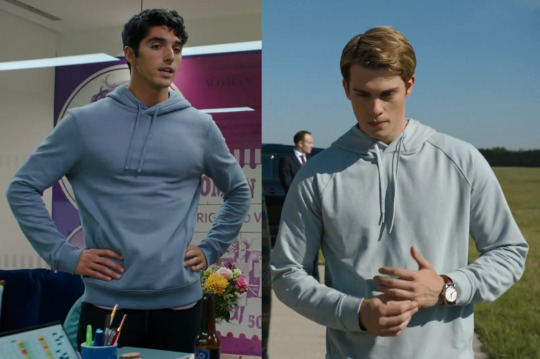
And now to our two mains - lets start with Henry.
Henry
The bulk of Henry’s wardrobe is double breasted suits - a key theme for the members of the royal family - not one else where’s them - its a fun costuming choice, cease generally speaking the double breasted suit isn’t in fashion at the moment - the film fit single breasted suits we see on the rest of the characters is. It's a very clear choice to create a them and us concept in a visual and telling way. the other thing to note about these db suits is that only Henry wears plain fabric - the ones we see on Phillip and James are pinstripe or woven stripe. I want to quickly mention the tie King James is wearing because of its very obvious pattern. it is the only loudly patterned tie in the entire film - all others are either, plain , striped or spotted. In the book Henry says that patterned ties are considered too political (i'm paraphrasing and can't find the actual quote!!) and here we have a king playing with politics wearing a patterned tie - I love tiny nods like this to the original source material that only those of us who love the book will pick up on - its just a tie to the ga!
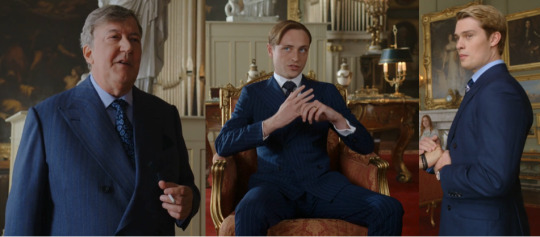
Henry himself wears pinstripes - when he is at his most royal - so for example when he is taking part in the PR exercise post cakegate. His ties also fit into this theming - he almost exclusively wears striped ties excepting at a couple of key moments - when he’s undertaking skulduggery and the yellow one he wears for the election. at all other times he has stripes on his tie. the stripes get wider or skinnier depending on the situation - the wide ones tend to be for royal events while the skinnier stripes tend to be connected to Alex.
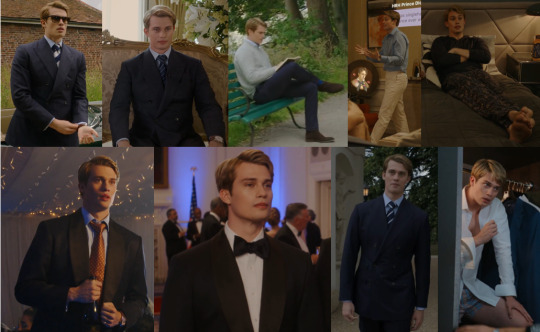
Another thing to note with Henry is the lack of black he wears - the only time is at the most royal of occasions - the wedding - all the rest of his suits are varying shades of blue or grey (and cream) even the tux he wears to the PM dinner is a dark navy with black lapel rather than black - it differentiates him from everyone else in the room (esp Miguel) and shows him as the object of Alex’s gaze. I also want to mention the royal blue theme we see on him - something I love Keith Madden for doing - Henry nearly always has something blue on him and a lot of the time (especially connected to times when he is doing something connected to his status as a royal) we see him wearing something royal blue - its why his riband at the wedding is royal blue rather than the lighter blue of the order of the garter - but we also see it in the royal blue socks we see him in several times, the royal blue pyjamas when the hack/leak comes to light and the blue shorts in Texas when he’s lying on the bed before he leaves to return to England. We also see him in a lot of blue shirts keeping that blue theme connected to him.
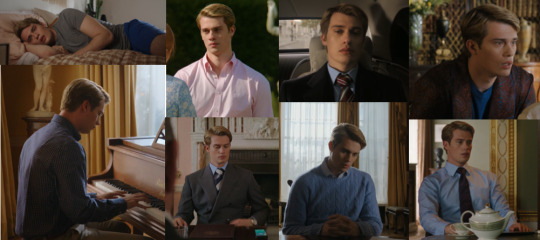
Then there is my most beloved check theory - (its a theory connected to 911 for those who don’t know my costume metas already) Check is connected to foreshadowing of trouble - Henry wears a check/plaid pattern at a couple of very very key moments - at the bar in Texas - when we see Alex realise his love is the forever kind, when he is back in England having broken his own heart in a misguided attempt to save Alex (gingham shirts in pink and blue) and then the suit he wears when he choses himself over the crown and steps out onto the balcony with Alex to greet the crowds has a subtle check pattern (not sure if you can see it its the pictures but if you watch the scene you should be able to) all of these are moments which foreshadow the upcoming or current trouble in his life.
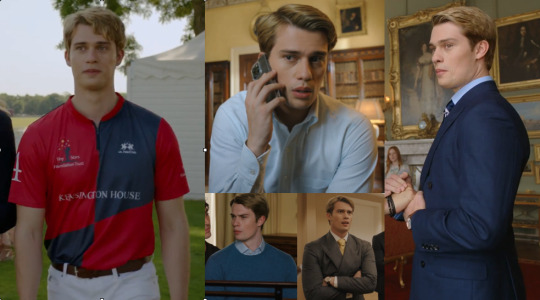
Yellow roses - symbol of Texas being flipped - from Mexican to independent (and eventually becoming part of US) - symbol of the fact Texas is about to flip blue from red. Yellow roses are also a symbol of good luck more generally and the yellow tie is a great choice to suggest neutrality in the election scenes (at this point in time Henry still has royal status). We see Henry in a grey suit with this yellow tie - this only further highlights his escape from royal life - when he is un the US we do not see him wearing the navy blue suits we see him in in England - the only exception is the dark navy dinner jacket he wears to the PM dinner . In the US he wears either a grey suit or the cream/light blue suit we see him in when he visits the lake house and the light blue linen jacket we see him on his light back to the UK is the only single breasted jacket we ever see him in - I would have loved to have seen the grey suit at the end also have been single breasted, but I'm guessing budget constraints prevented that from happening, as it really would've highlighted the difference between Henry George Edward James Hanover-Stuart Fox and Henry Fox!
At the lake house we get a piece of costuming that I love - the slightly differing short lengths we see on Henry and Alex - it Alex’s shorts are always shorter than Henry’s - it maintains that sense of Henry be more closeted and buttoned up - the overhead shot of them on the pontoon shows it really clearly - the two of them have similar leg lengths which serves me well here to show this point - the shorts Henry is wearing are at least 3 inches longer (possibly more) than Alex's - it isn't just that one pair of shorts - all 3 pairs of Henry's shorts are longer - its a costuming choice thats s perfectly in keeping with their respective characters.
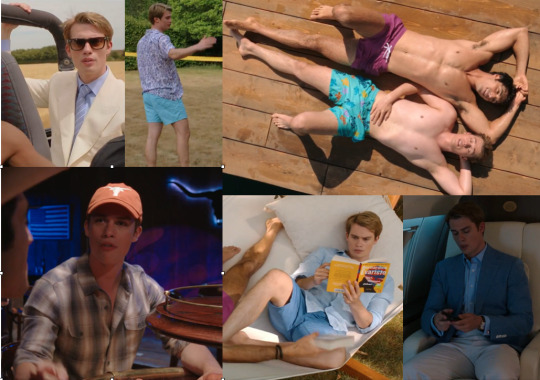
The final thing to talk bout is Henry’s rainbow turtle swim shorts - a cute nod to his being gay - especially as Alex is is his purple bi swim shorts. But there is also the fact that they are turtles. Turtles are a symbol of steadfastness, longevity, perseverance and transformation. they can also be seen as a symbol of everlasting love. there is also the concept of carrying the weight of the world - which is seen in its most explicit way in Terry Pratchett’s Discworld novels - where a giant turtle carries the world on its back. All of these metaphors and symbols perfectly fit Henry and his relationship with Alex - it is a symbol of the enduring nature of their love for each other, the perseverance we will see for them to overcome the obstacles thrown at them, the steadfastness of their love, as well the transformation we are seeing Henry go through - from closeted gay thinking he has to conform to the very rigid and dated ideals of his family - to the freer Henry we see in the US - the real Henry and the version of himself he so desperately wants to be but thinks he can’t - he has the weight of the world on his shoulders at that moment a la the disc world turtle.
Alex
Alex, obviously has the largest number of costumes, as well as the largest colour palette, but even that is pretty limited. In the same way we see Henry’s wardrobe go through a subtle transformation, we also see the same for Alex, almost in the opposite direction - while Henry’s wardrobe becomes freer, Alex’s becomes more grown up - more mature and conveys his growth as a person - becoming more certain in who he is. I’ve already written a fair amount throughs this meta about Alex’s costumes, so this section is a little shorter than Henry’s for that reason!
We get rebellious Alex to begin with - the leather jacket easily conveys this to us, its almost a universal symbol or rebellion in costuming speak at this point and one of the reasons I like its use here is that it very quickly sets him apart from everyone else in the film - yes its early on, but he is the most casually dressed character by a long way - and this jacket it the antithesis of the buttoned up penguin suit from the wedding - it emphasises how uncomfortable Alex was in that environment and as a result gives the heavy drinking we saw before the cake went flying purpose and visually sets him up as the lead and as a rule/ convention breaker. The same is true of the greyscale with leopard print Hawaiian shirt which is meant to contrast him dramatically with Henry, who is still stuck in that stuffy double breasted suit prison of convention and expectation to behave a certain way - the costuming does a big chunk of the work in giving us rebel v prince in those opening scenes. I actually like that they brought the leather jacket back for the drive to the lake house - it sets up Alex’s falling in love arc nicely - in that it allows the idea of rebellion to continue flowing through the story - Alex wanting to be outing proud in Austin and not grasping that that isn’t an option Henry at this moment in time and is a nod to his not really understanding the different places he and Henry are in when it comes to what being out means for them respectively.
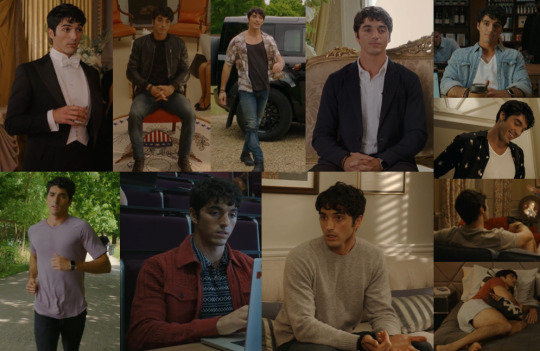
I’ve already written about the black and white colour way we see him in until his PR stint when we start see colour appearing in his wardrobe. I’ve put the pictures roughly in chronological order because it helps to show his progression, but it also shows the increasing amount of blue in his wardrobe, especially in moments connected with Henry.
To pick out some of my favourites - the Mexican pattern shirt with the red cardigan is wonderful - we have the shirt hinting at Alex’s heritage - in blue with the chunky knit red cardigan - I’ve written above about the use offered as a colour of passion and how that passion ebbs and flows - this cardigan also plays into that idea - it is the first time their texting becomes flirty - even the text message is in a red bubble on screen. This idea carries on with the orange red tee he is wearing during the turkey conversation - I made a post about that outfit being the same colour way as the turkey in question and how to talk turkey means to talk honestly and openly with someone - the very thing we see in that scene.
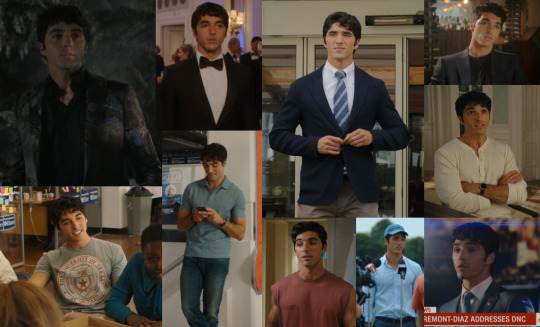
I adore the subtle yellow and blue jacquard embroidered New years jacket - the moment our boys connect and we move further into the lovers part of the enemies-friends-lovers trope and it keeps the yellow/blue theming an active part of the storyline. - the contrast with Henry’s orange tie is a choice - while there is a lot of colour at the NYE party Alex blends into the background while Henry is quite literally tied into the orange theme we’ve already seen in the furniture and sets - orange stands out and now we the audience are being drawn into unconsciously making the same connection that Alex is making - Henry is lonely, but he is an enduring and attention grabbing part of Alex’s life - it only further reenforces the direction of Alex’s gaze - green wearing flirty girl who??
We have a fair amount of Alex and the bi colour ways and we subtly see it coming into play from more or less the moment they start messaging - the light purple tee and purple message boxes, flowing through to the women sufferage wall and the fact he is wearing blue and purple in that scene with Nora in pink to round out the there colours. then we have the blue and purple colour ways he wears at the lake house - bolder and brighter - contrasting with the more muted shades from before - showing that he has recognised and accepted that part of who he is - he’ now out and proud and his parent know about him. I’ve used the old subtle a lot, but this is yet another example of transformation and growth for a character done subtly through colour. We also see him bathed in bi lighting at the bar when he has his 'OH I feel forever about him' moment at the Texas bar - he is the only one in that whole scene lit in that way - Henry is blue lit, while there is a more general lighting scheme that is blue/red dominant for the bar as a whole.
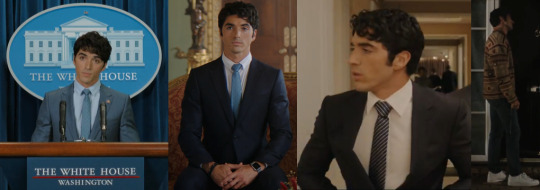
On to Alex’s suits and ties - he seems to have 5 suits and a jacket (not including the formal wear - tux and tails) a black one, 2 navy blue ones (one with a woven pinstripe that he wears in Paris) a bright bluish grey one and a grey one along with the black and blue waffle jacket we see him wear both on the PR trip and at the Polo match. I am obsessed with the fact that when he is in England he wears the navy suits and jackets whereas in the US he wears the other colour s suits - in the same way we see Henry less buttoned up and wearing grey and lighter blues in the US, here we see Alex fitting into Henry’s world and the navy blue suit uniform of the Royal family - its a wonderful piece of costuming that tells so much of how each of them are fitting into the others worlds, especially wen the black and navy waffle one is only worn early on - it is the cross over garment!
The ties have a similar story to tell - we see him wearing 4 ties - a yellow one we see in the beginning in the news reel and never see him in again and then we get the lighter blue striped one at the polo match - the one most similar to the striped ones we see Henry wear - suggesting he is trying to fit into this new world - Henry’s world - that he’s been invited into - its somewhat jarring for his character and plays on the idea of trying too hard - its therefore telling we don’t see it happen again - we only see hi in a striped tie again at he end during election night and accompanied by the black suit we saw him in a couple of times on the campaign trail in Texas. the blue tie is the only other tie we see him wear and it nicely connects all the key moments he has while in his suit - key political moments - his speech at the DNC followed by his speech to the press after the email hack and when he is at Buckingham Palace facing up to the King.
The final ting to talk about is the khaki green shirt jacket - I cannot tell you how happy I was with this costuming choice (and not because it was screaming Eddie Diaz from 911 vibes) khaki is so associated with military - with the army - anti is the most perfect choice for this scene - army are about war - they go somewhere to fight - to storm the palace etc so to have Alex - who has never worn anything remotely like this before rock up to KP to fight for his relationship - for his love - is the perfect choice, its a subtle yet clever way of emphasising the Alex has chosen to fight for what he wants - for his relationship with Henry and what makes it more telling is that we only see him change out of it once Henry has explicitly stated that he will try to be brave and that he wants history to include his love for Alex. It is why we see Alex in the yellow and blue Mexican patterned jacket - he no longer needs fight for his love because he has won - this yellow/blue jacket is a piece of costume tied into pivotal moments - we see the jacket twice - when he wins his bid to get the Claremont campaign to focus on Texas and Ellen tells him he’s going to Texas, and again when he has won the day with Henry and they are back together - in some ways that makes this his victory jacket - victory in his own personal battles - battles that are central to who he is and his development and I think that’s petty neat!
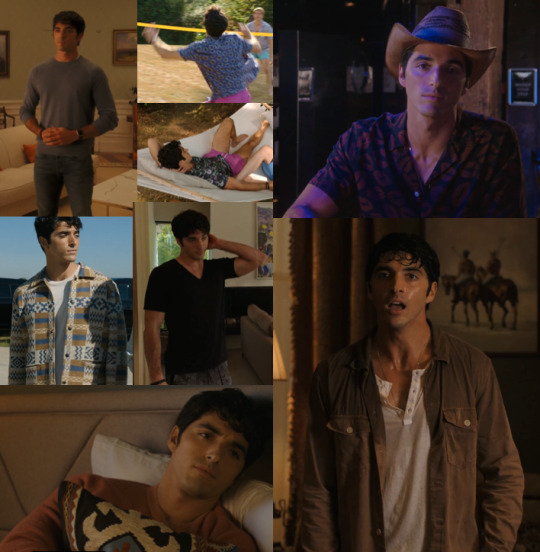
Hopefully you've enjoyed this deep dive into the sets and costumes of the film - I've loved writing it and I can only hope its coherent! Feel free to hit me up with any questions or comments and likes and reblogs are love ❤️🤍💙 thank you for reading and until next time...
#this really is a monster post!!!#rwrb meta#red white and royal blue#alex claremont diaz#henry fox mountchristen windsor#rwrb movie#first prince#costume meta#set meta#meta#long post#kym costume meta#costume theory#colour theory#colour theory meta#kym writes meta
176 notes
·
View notes
Text
Alright, guys, it’s been more than six months but it is time for a Radskier meta essay on why their storyline isn’t as badly written as many people say. (Includes spoilers)
Is it rushed? Yes. It’s a side-story of a side character and actually Jaskier’s first side-story on the show. Is it cliché? Yes. When I first watched the season I was terrified about where their story would be going, knowing what happened in the book and knowing how mainstream media treats queer storylines. (I did not know about Joey’s deep involvement in the writing until later.) But once I knew how it all ended, I was entirely sold. Of course, that’s a question of taste, Radovid just turned out to incorporate so many tropes I am obsessed with, but I am trying to say that compared to the overall writing of the show, their story is not particularly badly written, which blew me away considering it’s a queer storyline in a mainstream medieval fantasy show.
Yes, they gave Jaskier a queer story for the sake of having a queer story. That was another reason I was very anxious about it. But what they (read: Joey, and let’s be honest, Hugh too) made of it is so exciting to me.
Here’s the thing about them ageing up Radovid and making him Vizimir’s brother. I have seen people complaining that they could’ve introduced an OC instead of changing source material like that. But to me, the fact they chose Radovid makes it so much more than a queer storyline for the sake of having a queer storyline. He’s the prince and later the king of Redania. He is entangled in the greater scheme of things. He is /on/ the same chessboard as the main characters. Turning him into Vizimir’s brother rather than son is way less forced than introducing an OC to be Jaskier’s love interest. Because he is more than Jaskier’s love interest. He is the King of Redania, played by Dijkstra and Philippa. Also, he cannot be killed off.
As I already said because it’s obvious, their story is rushed. That’s just the fate of side stories in TV shows (that are not masterfully written, lbr). But to me at least it is amazing how much they managed to convey in these few scenes.
You have Jaskier’s role as a spy for the Redanian Intelligence. That begins his own side story where he has a role of his own, that has nothing to do with Geralt. He meets this guy who actually appreciates his music and openly flirts with him, showing that he is desirable, something new to the character of the comic relief (although he is the romancer but you know, we never saw it on screen, also this time he is being romanced). He is suspicious, because he knows the Intelligence is not to be trusted, and the Prince of Redania is kind of the enemy. But he is also Jaskier, and his interest is caught. Besides this interest, Radovid’s suggestion to bring Ciri to supposed safety is right up Jaskier’s alley, because he is one to rather avoid battles if possible. He ponders on whether it is a possibility.
Later, he uses this vague connection to Radovid to have some agency of his own. He negotiates with him about Rience without discussing it with Geralt. He’s following his own plan, checking out the possibilities. He’s like alright, this guy at least pretends to be into me, let’s see if I can put that to good use to help Geralt. He sweeps Radovid off his feet with his ballad, and then Radovid says things that blow Jaskier away. He speaks of his talents, of determination to get to know more about him, of how Geralt should be grateful for his loyalty and friendship. Jaskier, the comic relief, has never heard this before. He’s Weak and he’s Wanting™️. But he still knows that he is Jaskier, easily fooled by romance, and that there are great things at stake. At the same time, Geralt is also treating him with more respect to make the decisions harder on him. But Radovid stays on his mind, he doesn’t know what to make of it and discusses it with Vespula, and she knows. She sees what’s going on.
Then, Radovid shows up while he is looking after Ciri. He is still suspicious. But Radovid is different from the last time he saw him. He is scared and he is vulnerable, and Jaskier can see that the mask is gone, and that what lies beneath it is not a villain. He is still cautious, until Radovid sings him his own song and he cannot take it any longer. He is giving in, and he struggles still as he does, but he is Jaskier. He’s Weak and he’s Wanting™️.
The next morning, he is not surprised. Of course, stupid Jaskier got himself fooled by some pretty eyes once again. Of course such blatant desire and affection for him could have only been a lie. He never knew romance like this and he does not hesitate to believe it was simply not real.
But then, he finds Radovid surrounded by his dead guards, alone. The people he was supposedly scheming with left him behind, so he was not all that involved, maybe he really was their puppet. He’s scared and he’s full of regret, he’s a helpless prince in the middle of the outbreak of a war, but he’s telling Jaskier to not waste more time on him because he knows he fucked up beyond redemption. But he’s Jaskier. He has endless capacity for forgiveness. And now that their plans had failed and Radovid has no more reason to lure him in, he’s still begging for a second chance. He still wants to be with him. He wants to prove himself to him, even if that means leaving the court behind. Jaskier has other priorities right now and he’s still hurt, but if there is a chance that this affection he never knew before was real, he is taking it.
And Radovid? He’s the spoiled prince brat, underestimated by everyone (just like Jaskier), and he’s riding that wave, because he does not really care about state affairs. He likes Jaskier’s music, and when he sees him he thinks he’s hella fine. He has his fun and at the same time tries to show Philippa he’s capable of more than she thinks, but he was not expecting that Jaskier would blow him away like that. That he would challenge him (the Prince), that he would be honest with him, that he would see through his act and by doing that NOT underestimate him. Radovid is Vibing and he decides to enter Dijkstra’s and Philippa’s game until he realizes he Fucked Up with his arrogance and being a prince is actually worth shit. He knew everything going on in the castle is pretense, but he was not prepared for this level of violence. He is terrified when he meets Jaskier, and Jaskier is good to him. And, again, honest. Unlike anything he had known up to now, the courtly schemes that had only recently culminated to him being scared for his life. He is still a spoiled brat prince and wants to be with Jaskier very badly, so he Fucks Up again. It is that last mistake that makes him understand his faults. But when he sees that Jaskier still does not hate him, he is determined to fix it, and he will do anything. Fuck being a prince, I will leave everything I know behind to show this man that my feelings were true.
Jaskier changes this man’s entire life and Radovid is willing to do everything for him. Yes, the idea to just go off and find him WHEREVER was kind of idiotic, but that’s the beauty of these two. They are both smart and idiotic at the same time, and they let their actions be led mainly by emotions, which sometimes adds up to the idiocy of it all. But Jaskier has more experience, and Radovid learns from him how to be less selfish, he grows as a person through knowing him.
So yes, the love-betrayal-redemption story is hollywood cliché, but it fits the characters and leads to interesting character growth. And honestly, as a queer woman I enjoy seeing some queers having a cliché storyline in a mainstream media piece. Geralt and Yennefer had a similar story. It raises the queer love story to the level of the hetero story. They struggle and they suffer just as much as anyone else, and they have something that connects them, a story that has potential to be continued in an interesting way. They don’t just exist as the obligatory queers, and their storyline isn’t inherently queer either, to a point where it feels like they’re only queer so Jaskier’s love interest can be the gods forsaken King. (At the same time, the story has queer coded themes, like having to pretend to be someone else, but the way it is portrayed, it can be relatable to non-queers as well.) The cliché of it all does not feel more cliché than other storylines on the show (to me). Its not queered cliché, it’s just a story, and I love that.
Also, Joey and Hugh have actual chemistry. And - and no one really argues with that - immense talent that filled these few scenes with so many layers in the first place. We owe it to Hugh that Radovid is not just a romantic interest, but a layered, flawed character (although Hugh attributes it to the writing but he’s too modest).
The last thing I want to say is that I feel we are generally overly critical of queer storylines, which is not a bad thing per se, because we know how many harmful storylines there are, but I struggle to see how this one is harmful in any way. You have to relate them to the straight romances. The straights will just randomly smile at each other and then they will date, but no one complains about it being rushed.
I am obviously not saying everyone has to ship them, I genuinely do not care. I just think it’s unfair to drag their storyline when it is nothing but normal that they didn’t have enough time for an elaborate story, but they (meaning Joey and Hugh) put a lot of work into making it a good one regardless, an effort no one would have put into a straight love story, because they would not have had to.
#this turned out extremely long but cousin i had to get it out of my system#i already wrote a novel length fanfic about radovid but it was not enough#my opinions are my own make of them what you will#radskier#the witcher#the witcher meta#jaskier#radovid#twn#twn s3 spoilers#witcher#s: the witcher#otp: radskier#wiedzmin
59 notes
·
View notes